Catalan self-determination conflict timeline
The following timeline explains succinctly how we got here. It allows an understanding of the evolution of this movement, in which Catalan civil society impelled political leaders to organize a self-determination referendum.
-
Special Rapporteurs from the United Nations demand an explanation of the Catalangate espionage scandal.
Read moreThe experts show concern on the extent and sophistication of the espionage against minority leaders and activists who had not engaged in any violent activities, and condemn that it can increase self-censorship and threaten the rights to freedom of expression and assembly as well as other rights of minorities. -
The European Court of Justice rules that judicial authorities may refuse to execute a European arrest warrant on the basis of deficiencies affecting the judicial protection of an “objectively identifiable group of persons.
Read moreThe ruling by the CJEU affirms that European arrest warrants can be rejected when there may be abuses of an “identifiable group of persons”, and that they can only be repeated if they are proportionate. -
More than 10.000 people attend Assemblea’s demonstration against the new crime of aggravated public disorder.
Read moreThe suggested modification of the Spanish Penal Code, proposed by the Spanish government and supported by the governing party in Catalonia, eliminates the crime of sedition but includes a new crime of ‘aggravated public disorder’ that increases the minimum penalties for public disorder and is an attempt to facilitate the extradition of exiled Catalan representatives. It also facilitates jail sentences, incorporates intimidation, provocation, conspiracy and proposal as causes of the crime and sentences disqualifying workers and public officials. That is why several juridical and human rights organisations such as Amnesty International have shown their concern. -
The Council of Europe states that defending independence is not a crime.
Read moreThe Council of Europe publishes a document titled “Freedom of speech: an imperative for democracy”. According to this, freedom of speech is paramount for political debate and the function of democracy. Therefore, any interference with this right must come under the scrutiny of the courts, especially those defending fundamental rights. -
Catalonia’s former parliament speaker is on trial for disobedience for allowing votes on the monarchy and self-determination in 2019.
Read moreRoger Torrent, a former parliament speaker and currently the business minister in Catalonia, is on trial for disobedience, along with other members of the bureau: Josep Costa, Eusebi Campdepadrós and Adriana Delgado, for allowing votes in the chamber against the Spanish monarchy and in favour of Catalonia’s self-determination in 2019. -
Catalonia’s National Day: We’re back to win! Independence.
Read moreOver 700.000 attend this year’s Catalan National Day demonstration in Barcelona, to defend Catalonia’s independence and to denounce repressive practices, judicial persecution and illegal espionage on the Catalan independence movement by the Spanish state.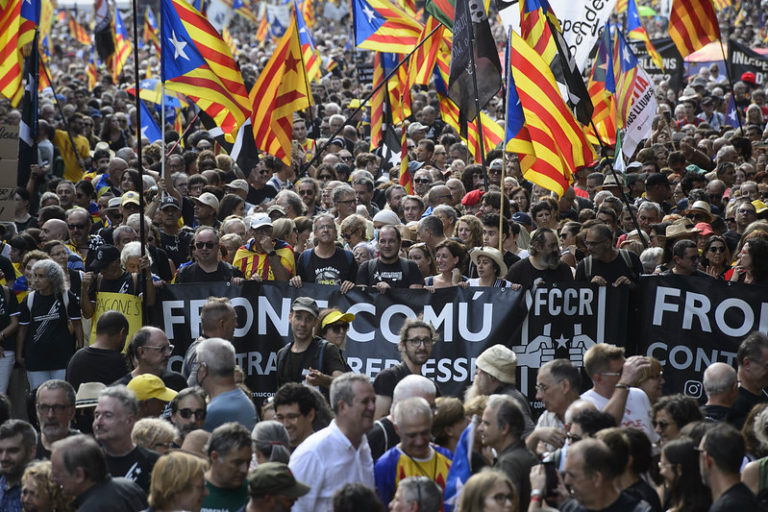
-
Spain infringes political rights of Catalan MPs, according to the UN Human Rights Committee.
Read moreThe UN Human Rights Committee finds that Spain violated the political rights of former Catalan Government and Parliament members by suspending them from public duties prior to a conviction following the independence referendum in 2017, under article 25 of the International Covenant on Civil and Political Rights. -
The Catalan and Spanish government agree to ‘dejudicialize politics and protect the Catalan language', in their third meeting to discuss the independence issue.
Read more -
The European Court of Human Rights finds Spain guilty of leaking ID photos of Catalan judges.
Read moreThe European Court of Human Rights (ECHR) finds Spain guilty of breaching some Catalan pro-referendum judges’ right to privacy when, in March 2014, the Spanish newspaper ‘La Razón’ publishes their ID pictures in an article naming the magistrates who had signed a manifesto in favour of a vote on independence in Catalonia. -
Citizen Lab uncovers Catalangate, the most sweeping case of political espionage with Pegasus spyware in the world.
Read moreSpanish authorities systematically carried out political espionage with Pegasus against the Catalan pro-independence movement. With 126 confirmed hacks against 65 persons using Pegasus, including political, social and cultural members of Catalan society, as well as activists, the Catalan case is by far the largest espionage case in the world using this spyware. -
Assemblea wins the Vice-Presidency of the Unrepresented Nations and Peoples Organization.
Read moreAssemblea’s President Elisenda Paluzie is elected Vice-President of the Unrepresented Nations and Peoples Organization. Winning the Vice-Presidency of UNPO, an international organization for the right to self-determination with 44 member bodies worldwide, is an important step for the Catalan pro-independence civil society organization to enhance its international role.
-
Catalan National Day’s demonstration: let’s fight and win independence.
Read moreOver 400,000 people participated in the Catalan National Day demonstration in Barcelona, the biggest political demonstration in Europe since the COVID19 Pandemic broke out, to defend fundamental rights in the face of authoritarian practices and judicial persecution of the Catalan independence movement by the Spanish state.
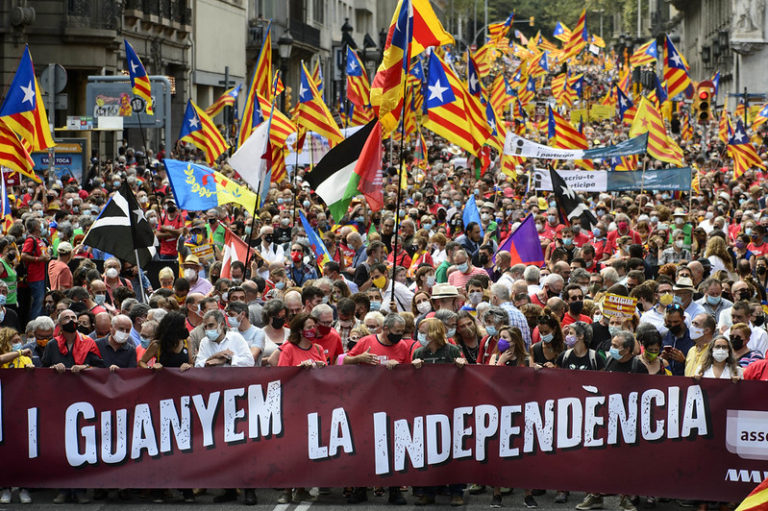
-
The Council of Europe calls on Spain to stop the political persecution of Catalan representatives, and Spain pardons the Catalan leaders.
Read moreThe resolution presented by the Council of Europe Committee on Legal Affairs and Human Rights calls on Spain to stop the persecution of Catalan political representatives and peaceful protesters, to release those incarcerated, to reform the penal code, and to refrain from asking prisoners to disown their political ideas. One day after this resolution, the Spanish government approves a pardon for the nine imprisoned Catalan leaders in an attempt to whitewash Spain’s international reputation.
The representatives are still banned from public office. -
The Parliamentary Assembly of the Council of Europe calls on Spain to reform the criminal provisions on rebellion and sedition.
Read morePACE’s Committee on Legal Affairs and Human Rights states that politicians should not face prosecution for statements made in the exercise of their political mandates, referring to the situation in Turkey and Spain.
The Committee calls on the Spanish authorities to reform the criminal provisions on rebellion and sedition, to consider pardoning the jailed Catalan politicians, to consider dropping extradition proceedings against Catalan exiled politicians and to drop the prosecution of lower-ranking officials involved in the 2017 independence referendum. -
The Council of Europe Commissioner for Human Rights calls on Spain to amend the Criminal Code to safeguard the right to freedom of expression.
Read moreThe Council of Europe Commissioner for Human Rights, Dunja Mijatović, expresses concerns about the lack of clear definition of some of the notions enshrined in the provision on glorification of terrorism and recalls the potential danger posed by the use, in anti-terrorist legislation, of catch-all labels and of broad and insufficiently defined offences which may lead to unnecessary or disproportionate restrictions to the right to freedom of expression. -
Catalan rapper Pablo Hasel is imprisoned for his lyrics against the Spanish monarchy.
Read moreThe rapper is sentenced to nine months in prison for criticizing the Spanish monarchy in songs and tweets. However, Spanish nationalists cry out fascist slogans and make apology of fascism with total impunity. -
The Spanish Supreme Court ousts Catalan President Quim Torra for having hung a freedom of speech banner.
Read moreThe Catalan president hung a banner in support of the Catalan political prisoners during an election campaign. -
The UN Rapporteur on Minority Issues highlights the increase of abuses towards the Catalans.
Read moreThe report highlights the significant increase in hate speech, vilification, vandalism, physical threats and even assaults against members of the Catalan minority, as well as allegations that these complaints are not investigated, thus aggravating intolerance by Spanish nationalism. -
The European Court of Justice rules that Oriol Junqueras had MEP immunity when he was jailed, and calls for his release.
Read moreThe EU’s top court rules that Catalan leader Oriol Junqueras was protected by immunity as an MEP when the Spanish authorities jailed him, and calls for his immediate release. -
The Spanish Supreme Court delivers the dreaded sentences of the Catalan pro-independence trial.
Read moreThe verdict, up to 13 years, is being applied to the accused in different degrees of sedition, disobedience and misuse of public funds. Rebellion, which was the principal charge of the accusation and is a criminal offence that requires violence, has not been proven according to the sentences.
The condemned are Jordi Sánchez, former president of the Catalan National Assembly (9 years); Jordi Cuixart, president of Òmnium Cultural (9 years); Carme Forcadell, former president of the Catalan Parliament (11,5 years); Oriol Junqueras, former vice-president of the Catalan government (13 years); Raül Romeva, former Foreign minister of the Catalan government (12 years); Dolors Bassa, former Labour minister of the Catalan government (12 years); Jordi Turull, former Presidency minister and spokesperson of the Catalan government (12 years); Josep Rull, former Territory and Sustainability minister of the Catalan government (10 years) and Joaquim Forn, former Interior minister of the Catalan government (10 years). The former Institutional Relations minister of the Catalan government Meritxell Borràs; former Justice minister of the Catalan government Carles Mundó and former minister of Culture and later minister of Business of the Catalan government, Santi Vila, are condemned to pay a fine for the crime of disobedience.
These sentences aim to punish the Catalan minority, especially the Catalan pro-independence movement. It does so by violating several human rights: the right to freedom of expression, right to peaceful assembly, right to the presumption of innocence as well as the right to a fair trial.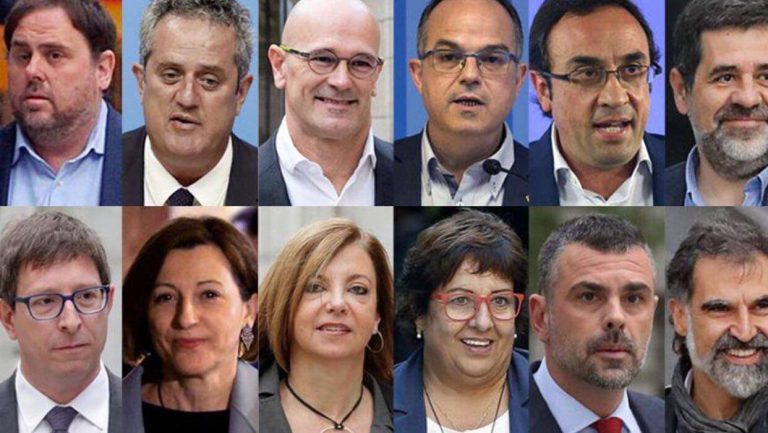
-
Nine pro-independence activists are arrested and accused of terrorism, of which seven enter preventive prison.
Read moreNine CDR activists (Committees for the Defence of the Republic), a peaceful associative movement, were detained at dawn in front of their families, and charged with rebellion, terrorism and the possession of explosives. Despite the formal secrecy of proceedings, deliberate leaks by the Spanish propaganda apparatus began to fabricate a narrative of violence in Catalonia. False information such as the possession of explosives have been denied even by the sources, leaving the accusation unclear and making it difficult to exercise the detainees’ right to legal defence.
Some media have linked the alleged terrorist group (which nobody has heard of in Catalonia) with the President of the Generalitat, Rt. Hon. Quim Torra, and with the exiled President Rt. Hon. Carles Puigdemont, in a sudden action clearly designed to criminalize the pro-independence movement. Yet again, the fundamental right of free association of Catalans has been violated by the Spanish authorities, which are trying to intimidate the Catalan minority to participate in public affairs and in politics.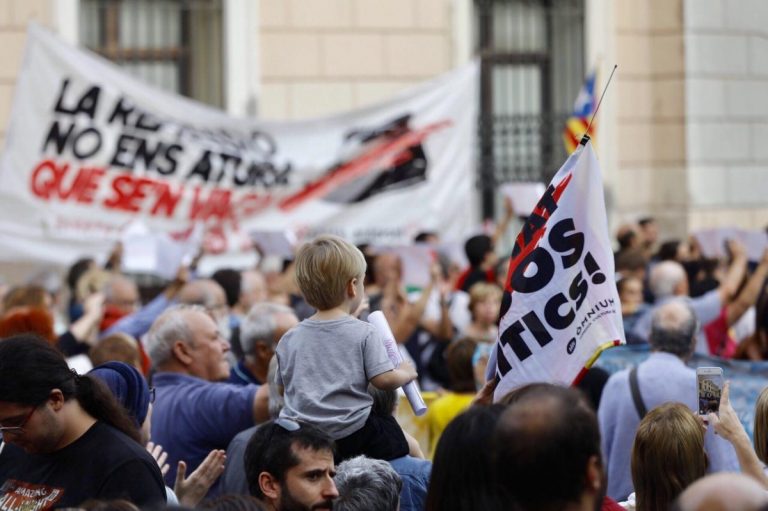
-
- September 11, 2019. Catalonia’s National Day: the biggest covid-adapted European demonstration.
Read moreOver 59.500 Catalan protesters demonstrate at over 130 locations to claim Catalonia’s right to become an independent state, and to defend fundamental rights in the face of increasingly authoritarian practices by Spain during and after the COVID19 pandemic.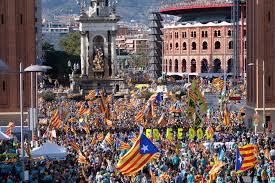
-
Constitution of the European Parliament: three Catalan MEPs are deprived of the right to take possession of their seats.
Read moreThe unlawfully deposed President, Rt. Hon. Carles Puigdemont, winner of the European elections in Catalonia, Toni Comín, illegally dismissed Health Minister and number 2 on his list, and Oriol Junqueras, the unlawfully deposed vice president and leader of the third most voted list, were deprived of taking up the office for which they had been elected. The Central Electoral Board did not let them to take the oath, two being in exile and the third in preventive prison. The administrative excuses of Madrid and those of the conservative president of the European Parliament did not satisfy many MEPs, who raised their voices against this dangerous precedent: almost 2.3 million voters can see that they do not have political representation in the European Parliament, - a violation of the right of political representation of the Catalan national minority.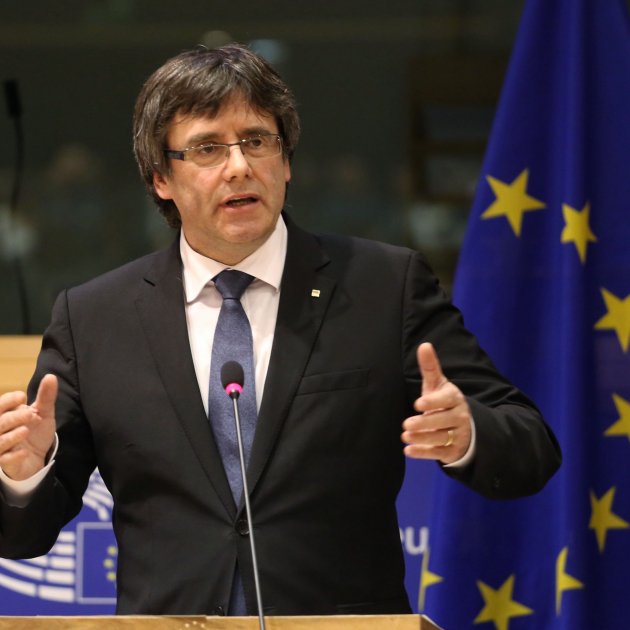
-
The show trial of the Catalan political prisoners comes to an end.
Read moreThe long trial ends with protests by defence lawyers over bias during the trial, the violation of the defendants’ political rights, among others, the media participation of the extreme right and other irregularities. The trial judgment is now awaited, and it is feared that it may sentence to 10 year conviction in some cases. The International Trial Watch organization wrote a report listing all irregularities detected during the trial.
International Trial Watch report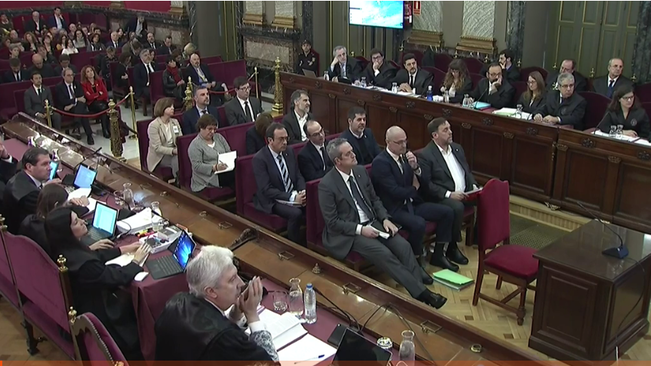
-
The United Nations Working Group on Arbitrary Detention, set up by the United Nations Human Rights Council, calls on Spain to immediately release the Catalan political prisoners.
Read moreTwo Opinions issued by this Working Group (one finally published on June 13 and the other on July 10) called on Spain to release of Catalan political prisoners and to acknowledge their right to obtain compensation and other types of redress. They state that their fundamental rights have not been respected, especially the right to freedom of speech. The Opinions consider that their detention was arbitrary and contrary to the Universal Declaration of Human Rights, with a clear desire to silence the demands for Catalonia’s self-determination. Moreover, they point out that the trial was not fair in its form, in having biased judges who have ignored the presumption of innocence and have allowed political interference in the trial.
First opinion (translation from Spanish)
Second opinion (translation from Spanish)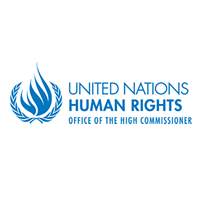
-
The Catalan pro-independence parties win the European and municipal elections again.
Read moreIn the election to the European Parliament, the most voted option in Catalonia was “Junts per Europa» (Together for Europe), led by the exiled – and illegally deposed – president, the Rt. Hon. Carles Puigdemont. Just behind the second party came “Ahora Repúblicas” (Now Republics), led by Oriol Junqueras, the illegally dismissed Vice-President, who is in pre-trial custody accused of rebellion and sedition. In Catalonia, the independence forces won a historic 49.71% of the votes, while the unionist parties obtained 37.93%.
For its part, the pro-independence party Esquerra Republicana came first in the local election in Barcelona, but the non-independence coalition of the Comuns joined forces with Unionist parties to retain the mayorship.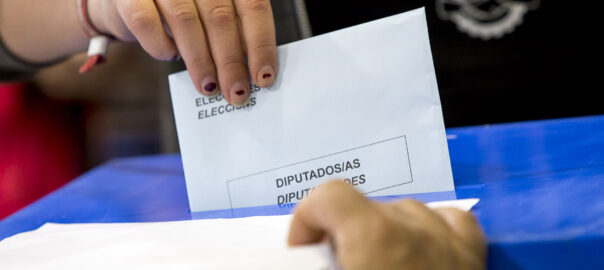
-
120.000 demonstrate in Madrid: Self-determination is not a crime
Read moreOn the 16th of March, a historic demonstration took in place in Madrid, where Catalans marched peacefully in defence of the right to self-determination. They were accompanied by Andalusian, Basque, Galician and Castillian collectives and trade unions, who whished to express their support to the right to self-determination. Together, they claimed for justice and condemned the political prosecution and trials against the Catalans leaders and against other political dissidents in the Kingdom of Spain.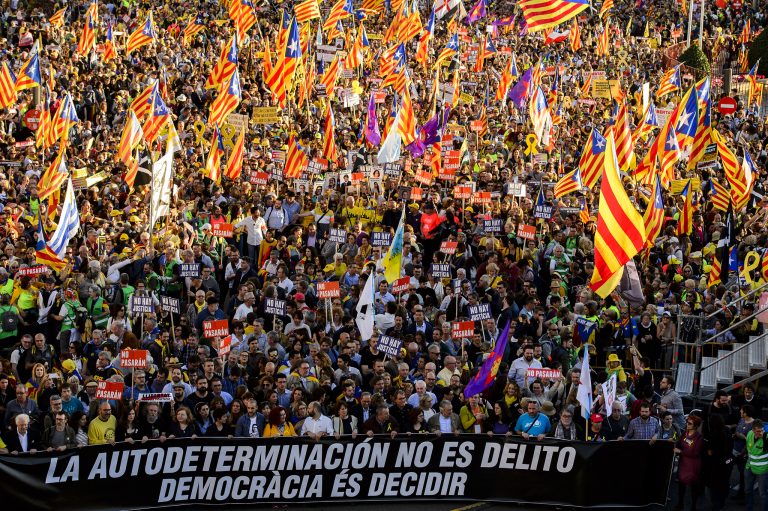
-
The show trial against the Catalan political and civil society leaders starts
Read moreThe Catalan defence counsels accuse the Supreme Court of being biased, violating fundamental rights and criminalising political dissidence.
The Catalan leaders are accused of breaking the law for having organised an ‘illegal’ referendum. First, organising a non-authorised referendum was taken out of Spain’s Criminal Code in 2005, which makes it impossible for Spain’s Justice to prosecute them for that. That is why the trumped-up charges of rebellion and sedition were invented, implying a violent uprising. Second, Spain is signatory and a ratifying party of the UN Charter and the International Covenant on Civil and Political Rights, treaties that oblige countries to respect and to promote the right to self-determination. Being fully part of Spain’s legal system, Spain is as such acting illegally according to international law.
Apart from that, Jordi Sànchez and Jordi Cuixart, the two civil society leaders imprisoned for having given support and organised peaceful demonstrations, are also being sued for rebellion and sedition. These are clearly accusations meant to apply a chilling effect on civil society actors exercising democratic liberties and is a clear attack on the right to assembly, peaceful protest and freedom of expression.
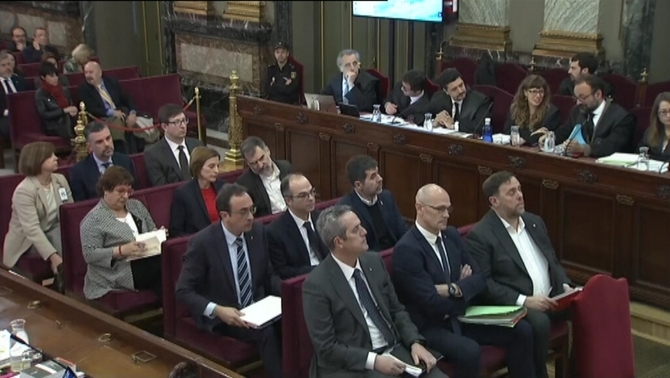
-
Catalan political prisoners start hunger strike
Read moreIn total, 4 jailed Catalan leaders went on hunger strike to protest against their treatment by the Spanish judicial system, accusing it of “severely violating our fundamental rights, including the right to the presumption of innocence.”
The 9 jailed Catalans, some of them in pre-trial detention for more than a year, have repeatedly asked for their liberation, which was systematically denied by Spanish Justice. Against these decisions, they appealed to the Spanish Constitutional Court, which own jurisprudence says such fundamental rights appeals have to be solved within 31 days, if they’re not denied, as happens in 99% of the cases according to the court’s own data.
By deliberately not judging on these appeals, now more than a year as lament the political prisoners, the Constitutional Court blocks the access to the European Court of Human Rights. The prisoners state that they “do not passively accept any discrimination or unwarranted procrastination.” They therefore started this hunger strike to protest against the Constitutional Court’s “unjust and arbitrary behaviour”.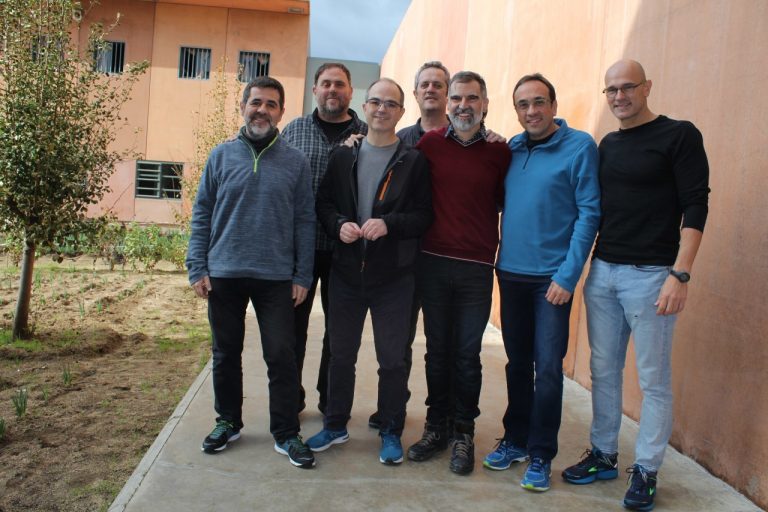
-
Spanish prosecution demands lengthy prison terms for 'uprising'
Read moreThe Spanish Attorney-General announced the prison terms the prosecutor’s office will demand against the 18 Catalan independence leaders and for which accusations. The heaviest accusation is that of ‘rebellion’, an ‘uprising’ including ‘force, aggression and violence’. The longest prison sentences are demanded for former deputy PM Oriol Junqueras (25 years), civil society leaders Jordi Sànchez and Jordi Cuixart (17 years) and former speaker of Catalan parliament Carme Forcadell (17 years). Eight more face 7 to 16 years behind bars.
In the meantime, Catalan policer major Josep Lluís Trapero and his lieutenant, plus two former interior ministry officials, have been accused of rebellion or sedition by the special Spanish National Court, facing prison sentences up to 11 years.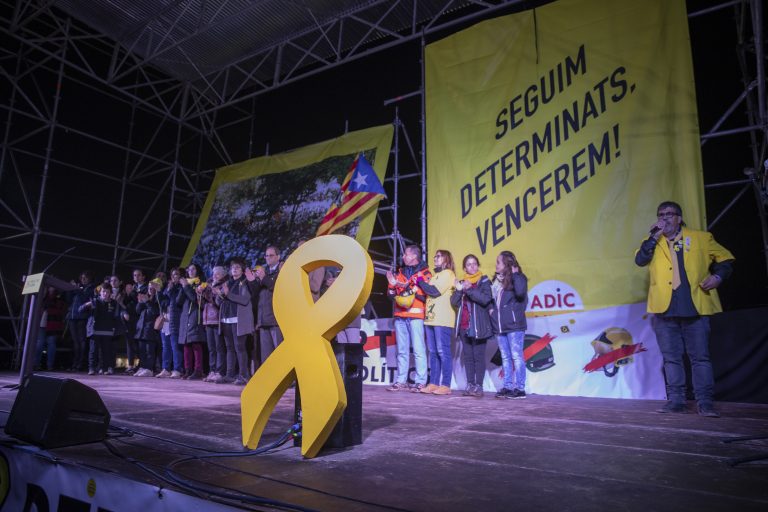
-
1 year of imprisonment for Jordi Sànchez and Jordi Cuixart: 1 year of injustice
Read moreExactly one year has passed since Jordi Sànchez, then President of the Assemblea Nacional Catalana (ANC) and Jordi Cuixart, President of Òmnium Cultural (ÒC), have been in preventive detention, accused of rebellion and sedition for having defended freedom and democracy and having exercised such fundamental rights as that of nonviolent protest. Sànchez and Cuixart are currently immersed in a lawsuit tainted from the very outset by countless irregularities. The lawsuit is based on invented, non-existent acts of violence attributed to both men. Preventive detention itself, applied in this case with the clear intention of instilling fear into the citizenry, is an anomaly since it may normally be used only as a last resort.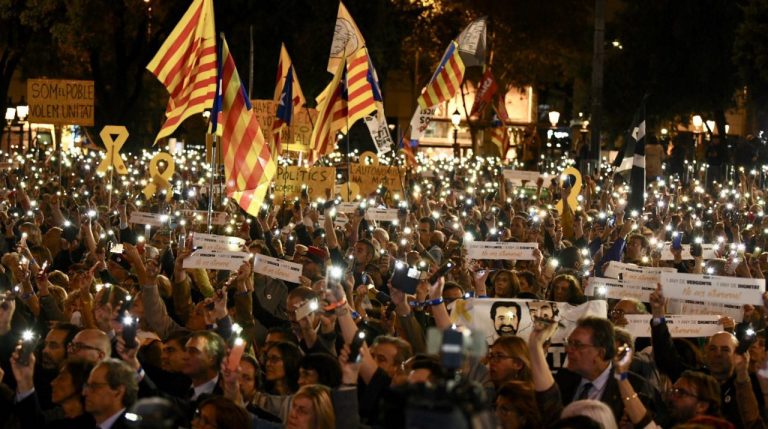
-
Catalans rally a year after the Referendum for Self-Determination on October 1st to insist on making it effective
Thousands of people rally throughout the day on the first anniversary of the independence vote. 180,000 in Barcelona and thousands in Tarragona, Girona and Lleida gather in demonstrations organized by the Plataforma 1 d’octubre against repression and calling for the jailed political leaders to be released.
Protesters leaded by the Committees for the Defence of the Republic occupied streets in Barcelona and Lleida, blocked motorways and a high-speed rail line and surrounded the Catalan parliament under the lemma "October 1st, neither forgiving, nor forgetting".
-
6,000 people summon to counter protest against the Jusapol (Spanish police association) rally in Barcelona
Read moreCatalonia police force Mossos d'Esquadra charged against thousands of pro-independence who tried to prevent that the protest organized by the Spanish police association Jusapol in downtown Barcelona in homage to the police officers that beat voters on the Referendum, could be carried out normally. The memory of police violence against voters comes back.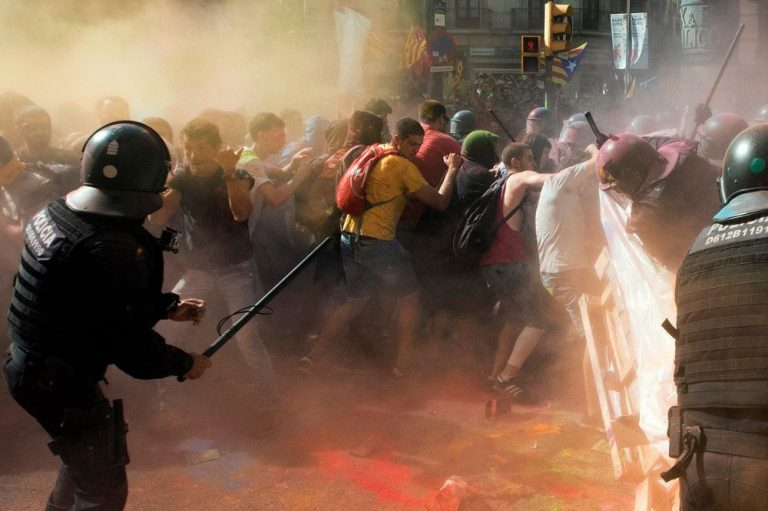
-
Thousands of pro-independence demonstrators gather in Barcelona
Read more15,000 people concentrated in front of the headquarters the Catalan Economy Ministry
to mark one year of the police macro-operation of September 20th last year and the citizen mobilization which lead to the imprisonment of the leaders of Catalonia's main pro-independence movements in Barcelona, Jordi Sanchez and Jordi Cruixart.
The demonstration was convened by the Catalan National Assembly (ANC) and Òmnium Cultural, claiming the right to freedom of speech.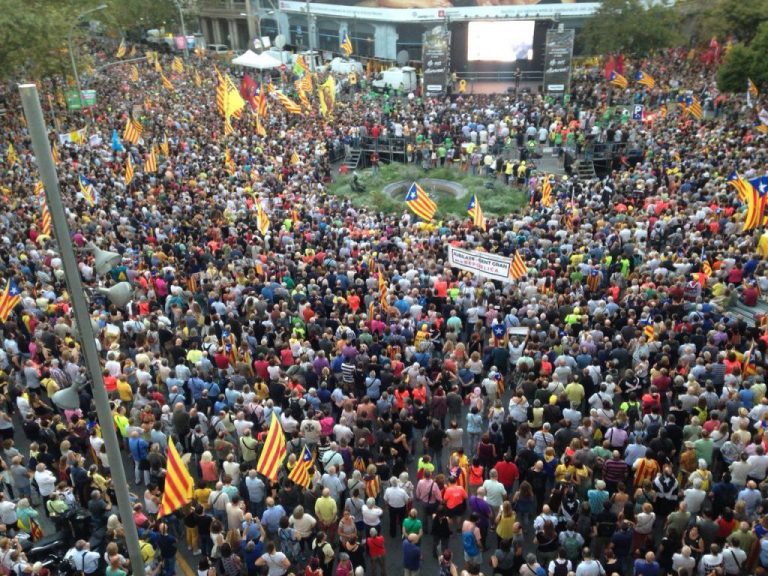
-
The Diada after the 1-O; one of the most massive National Days
Read moreOver a million of people have filled Barcelona today to demand independence for Catalonia. The slogan of the demonstration was ‘Let’s build the Catalan republic’ and illustrates the demand for the application of the democratic mandate arising from the Oct 1 referendum on self-determination, when 90% of voters (43% of the Catalan electorate) voted in favour of Catalan independence. At 17.14h precisely, the demonstrators at one of end the Diagonal Avenue started a wave of sound, holding up banners. Meter by meter, just like in a domino effect, the wave of sound moved on to the other end of the demonstration, where it symbolically felled a wall.
Human rights lawyers Ben Emmerson and Aamer Anwar and Prof Schulze MD were some of the speakers this year at the Diada. And ANC president Elisenda Paluzie demanded the establishment of the Catalan republic while The Diada – the Catalan National Day, celebrated worldwide.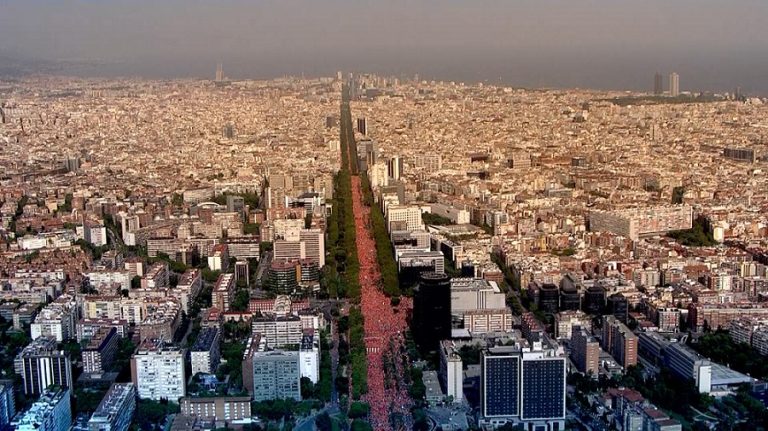
-
Judge Llarena withdraws all European extradition warrants for rebellion
Read morePablo Llarena withdraws all European extradition warrants for rebellion of all the exiled Catalan Ministers.
From this moment, they can freely circulate in all countries, except Spain, where they would be detained.
With this decision, judge Llarena has been fully exposed, and he finds himself in an unprecedented contradiction: there are seven Catalan politicians in exile, five of whom were members of the Catalan Government on October 1 2017, that can move freely around Europe, but cannot set foot in Spain without being detained, while in Spain there are nine political hostages, accused of serious but non-existent crimes such as rebellion – that the Belgian and German courts have ruled out –, and who have been in preventive detention for months and without a trial having been held.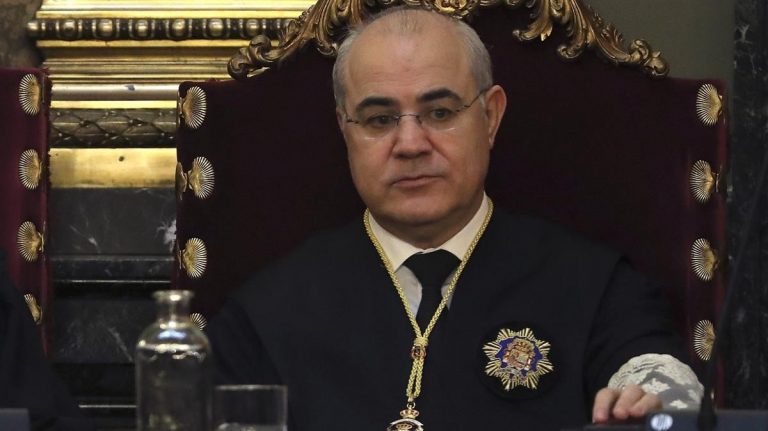
-
Massive march demanding freedom for political prisoners
Read more200,000 gather in a protest called under the slogan “ Neither prison nor exile. We want you home” organised by ANC, Òmnium and ACDC. -
German court rules out rebellion and sedition
The Schleswig-Holstein court decides to process the European Arrest Warrant (EAW) to extradite Carles Puigdemont on charges of misuse of public funds. In contrast, charges of rebellion and sedition have ended up being discarded, since the court has considered that violence in the events for which his extradition was requested cannot be proved, and because the crime of sedition is not contemplated in the German criminal code.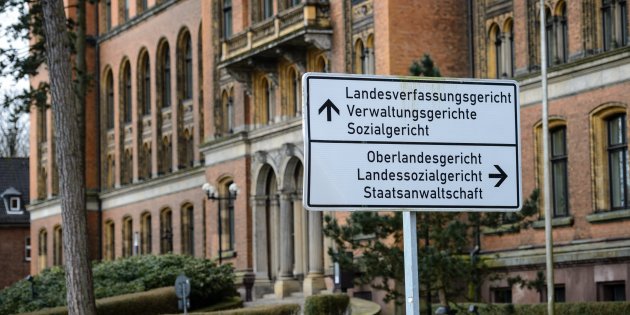
-
The Government in exile takes judge Llarena before the Belgian courts
Read morePresident Carles Puigdemont and the rest of the Government in exile present a civil suit before the Belgian courts on the bases of impartiality and prevarication in his judgement of the Catalan independence process. Belgian law summons the judge to declare on September 4.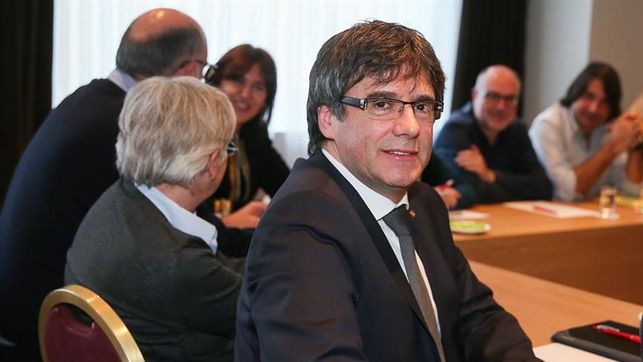
-
Motion of no confidence against Rajoy
Read moreThe motion was registered by PSOE on 25 May after the ruling PP was found to have profited from corruption. The motion was successful and resulted in the downfall of Mariano Rajoy's government and in PSOE leader Pedro Sánchez becoming new Prime Minister of Spain. Rajoy announced on 5 June 2018 his resignation as PP leader after having led the party for 14 years. The independentist parties (ERC and PdeCat) vote in favor of the motion and are decisive in the downfall of Mariano Rajoy.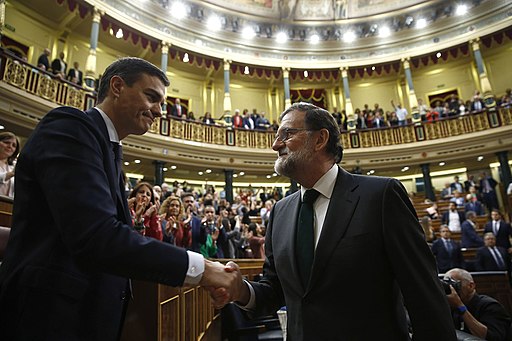
-
Belgium rejects the extradition of Comín, Serret and Puig due to a formal error by Llarena
Llarena's error detected by the Belgian authorities was not to issue an arrest warrant in Spain against the exministers when it issued the extradition request on 23rd March. Community legislation requires that the euro-order should be the translation of a national arrest warrant. Nevertheless, Llarena linked the euro-order to the indictment sheet instead of a national arrest warrant. The Belgian Prosecutor's Office notified Llarena of this error in the exchange of information that they had the past month of April. The case of the exministers in Belgium is closed because the Supreme Court can not appeal the refusal to extradite them.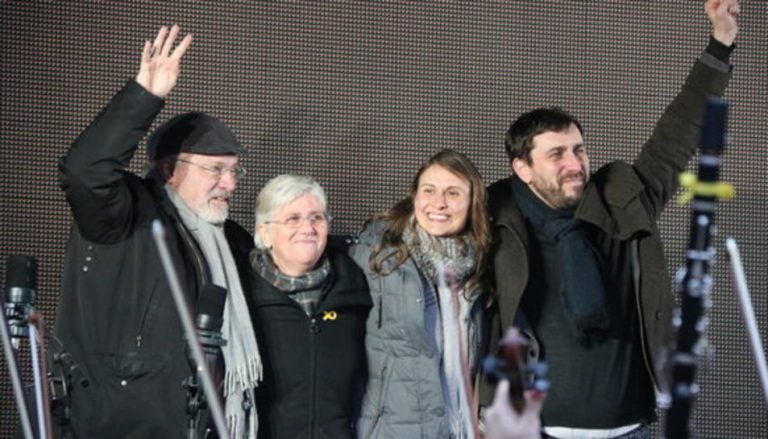
-
Quim Torra, 131th president of the Generalitat
Read moreThe negotiations between Junts per Catalunya and ERC lasted several weeks and, finally, on May 10, the investiture was announced and a new candidate was proposed after the failed attempts of Carles Puigdemont, Jordi Sànchez and Jordi Turull, as they were blocked by Spain.
The new candidate proposed by President Puigdemont himself is Joaquim (Quim) Torra, Deputy of Junts per Catalunya.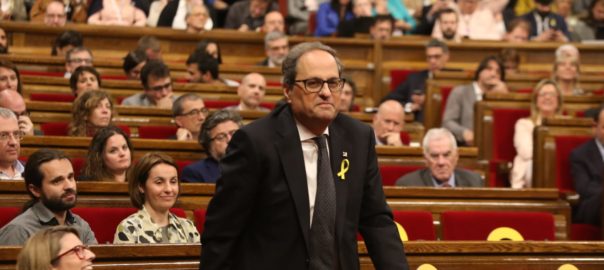
-
Thousands march in Barcelona for jailed Catalan leaders
Read moreHundreds of thousands turned up for the protests called by ANC and Òmnium to mark six months since the arrest of their leaders (Jordi Sànchez and Jordi Cuixart). -
Members of CDR detained for road protests
Read moreTamara Carrasco, member of the CDR (Committee for the Defense of the Republic), was detained for blocking roads during Easter 2018 on terms of rebellion and terrorism. The protests were peaceful and nobody was harmed although tires were burned to block the roads. After a few days in custody she was released on the condition that she doesn’t leave her hometown Viladecans.
Another member of the CDR, Adrià, fled from Spain when he was about to be detained. At the moment, Adrià is in Brussels where President Puigdemont's law firm works in his case.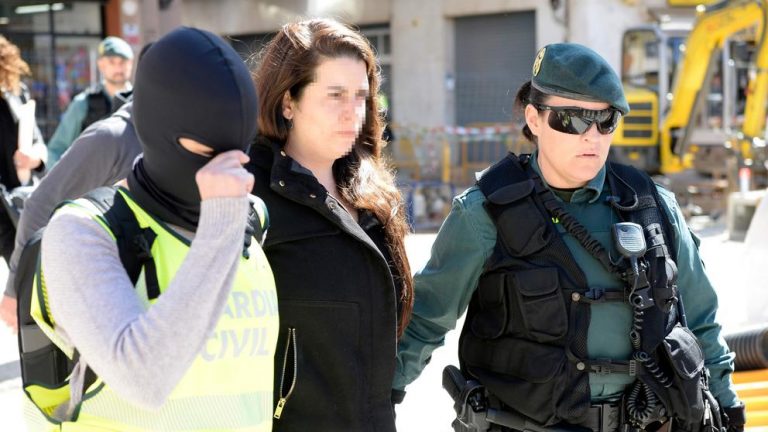
-
Germany frees President Puigdemont
Read moreThe Audience of Schlesvig-Holstein released bail to Carles Puigdemont and dismissed, at the same time, his extradition to Spain for the crime of rebellion.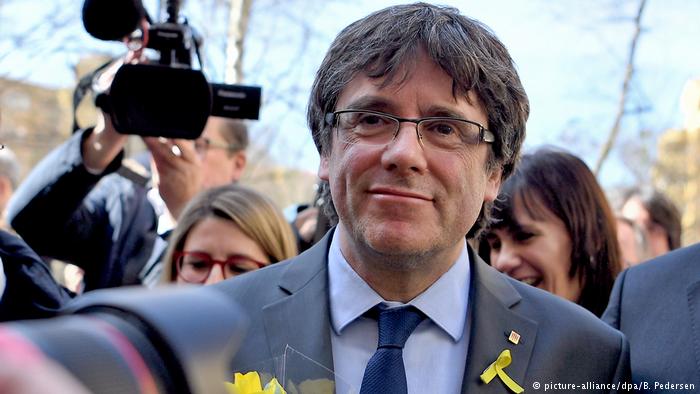
-
The UN accepts the complaint of President Puigdemont about the lack of human rights in Spain
Read moreThe United Nations accept the formal complaint filed by President Puigdemont the 2nd of March about the lack of human rights in Spain alleging that Spain has committed several violations in many of his rights.
Spain and its judiciary system are totally exposed to the public opinion at an international level.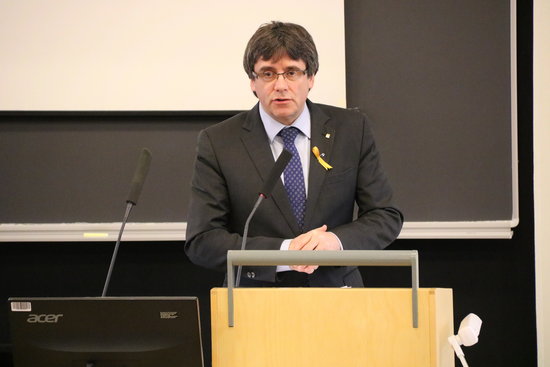
-
Detention and imprisonment of President Puigdemont in Germany
Read moreThe legitimate President of the Generalitat de Catalonia, Carles Puigdemont, was detained by the German authorities on the border with Denmark, while he was returning to Belgium from Finland. With the European extradition warrant reactivated, judge Llarena was able to intercept Puigdemont with the help of the German police, who kept him under custody in Neumünster, waiting on his extradition to Spain. 55,000 gather in a protest rally the same day organised by ANC and Òmnium.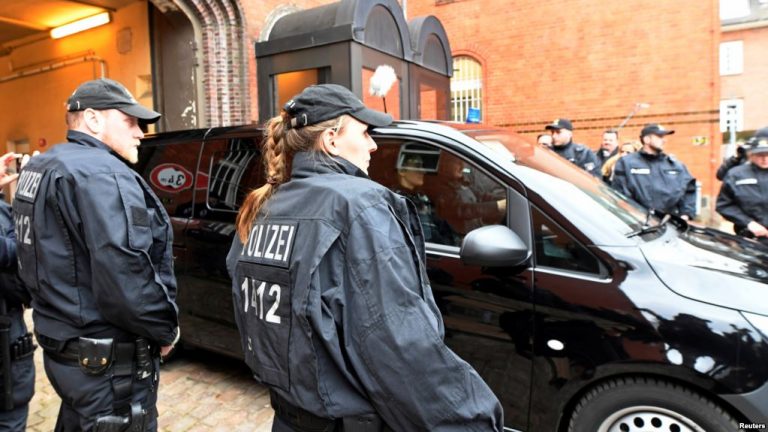
-
New political prisoners
Read moreAfter the failed investiture of Jordi Turull, Judge Pablo Llarena calls Ministers Jordi Turull, Josep Rull, Dolors Bassa and Raül Romeva; ERC deputy Marta Rovira and the Speaker of the Parliament of Catalonia Carme Forcadell to the Supreme Court.
They are sent into pre-trial detention without bail.
Rovira, Forcadell and Bassa resigned their seats in Parliament the night before, and Marta Rovira fled into exile in Switzerland.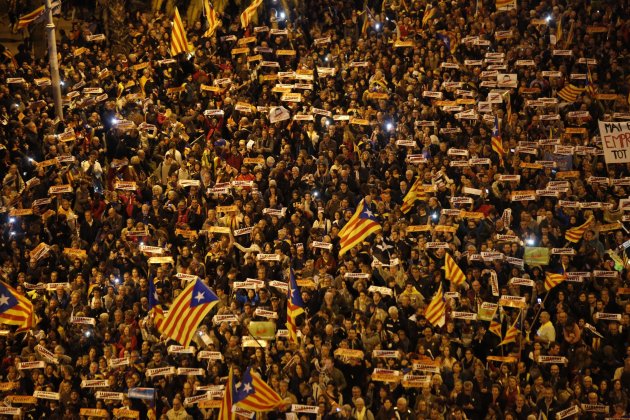
-
The failed investment of Jordi Turull
Read moreJudge Llarena does not allow Jordi Sànchez to leave the prison of Soto del Real to attend his investiture as president of the Generalitat. Junts per Catalunya proposes a third option for the position of President of the Generalitat de Catalunya: the deputy and ex-Minister Jordi Turull. Even so, Turull does not obtain enough supports as CUP did not vote for him.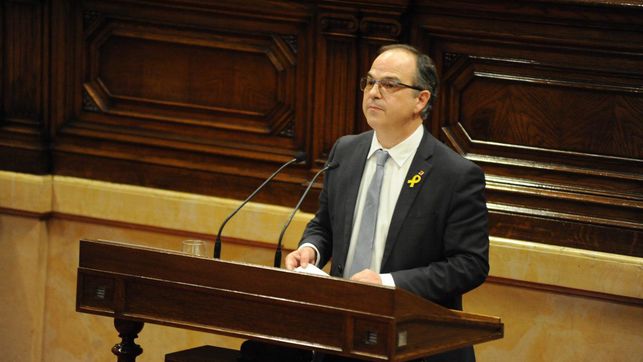
-
Formation of the Council of the Republic
Read moreWith President’s Puigdememont step aside, he announces the formation of a new organization presided by himself that will act from exile in Brussels: the Council of the Republic. A private organization that will work for the internationalization of the Catalan Independence Process and care for the creation of republican structures. In addition, it will be independent from the Government of the Generalitat in order to avoid any Spanish State interference.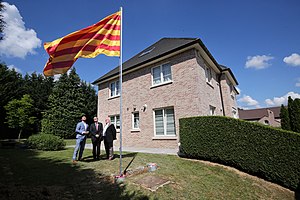
-
Provisional step aside of President Puigdemont
Read morePresident Puigdemont decides to provisionally step aside and discard himself as a candidate to preside over the Generalitat de Catalunya. He then proposes Jordi Sànchez, president of the ANC and number 2 of the list of JxCat, as a candidate. Jordi Sànchez is still in pre-trial detention. -
Casserole protest
Read moreThe King of Spain Philip VI has scheduled a visit to Barcelona on occasion of the Mobile World Congress, the largest mobility fair in the world. His arrival, was not attended by any representative of the Generalitat de Catalunya, nor by the mayor of Barcelona Ada Colau nor by the President of the Parliament Roger Torrent.
The CDR (Republic Defense Committee) organized protest rallies against the royal visit, which grow up to be a casserole protest in all the cities of Catalonia.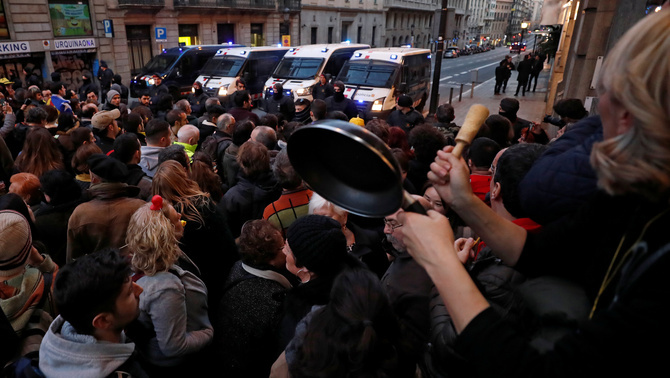
-
Postponed investiture of Carles Puigdemont
Read moreThe newly elected President of the Parliament of Catalonia proposes Carles Puigdemont as the candidate to preside over the Generalitat of Catalonia, the candidate with more support. The days before the investiture could be held, however, the Spanish Government asked the Constitutional Court to suspend the investiture of Puigdemont on the grounds that he was in Brussels.
The Constitutional Court then decreed that Carles Puigdemont could only be invested if physically present in Parliament; yes, with the prior authorization of Pablo Llarena, judge of the Supreme Court. This never happened.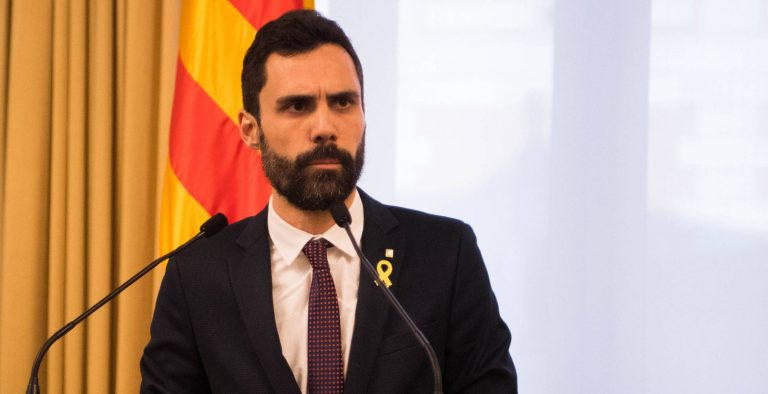
-
Establishment of the new Parliament of Catalonia - Roger Torrent
Read moreCarme Forcadell, former President of the Parliament of Catalonia, refuses to repeat the position alleging that it is incompatible with the legal causes open to allow the vote on the Declaration of Independence on October 27, 2017.
When the elections were won, the Republican Bloc agreed that the presidency of the Parliament would be for the ERC, while the presidency of the Generalitat would fall to JxCat (Carles Puigdemont). In this way, therefore, ERC proposed Roger Torrent as the new president of the Parliament of Catalonia. Neither the exiled Consellers nor the prisoners were allowed to vote in the election. Even so, the abstention of Catalonia in Comú-Podem allowed the inauguration as President the Parliament of Roger Torrent and a new independence majority in the Bureau of the Parliament.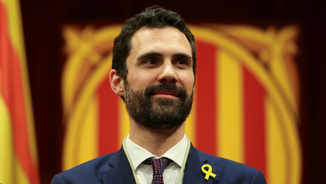
-
Pro-independence parties won yet another absolute majority in the Catalan Parliament
Read moreThe elections held on December 21, 2017 in the Parliament of Catalonia convened by the President of the Spanish Government, had a tense electoral campaign that prohibited symbols and, even, the yellow color, color that was related to the Freedom of political prisoners and, in turn, the independence movement.
On this occasion, the pro-independence candidates didn’t agree to form a single list, and in the different pro-independence lists, there were candidates who were in jail or in exile.
The participation was 79.09%, the highest in the history in elections to the Parliament; and the Republican Bloc won the elections with 47.5% of the votes and 70 seats. Unionist had 43.47% of the votes and 57 seats. Non aligned (En Comú-Podem) had 7.46% of the votes and 8 seats.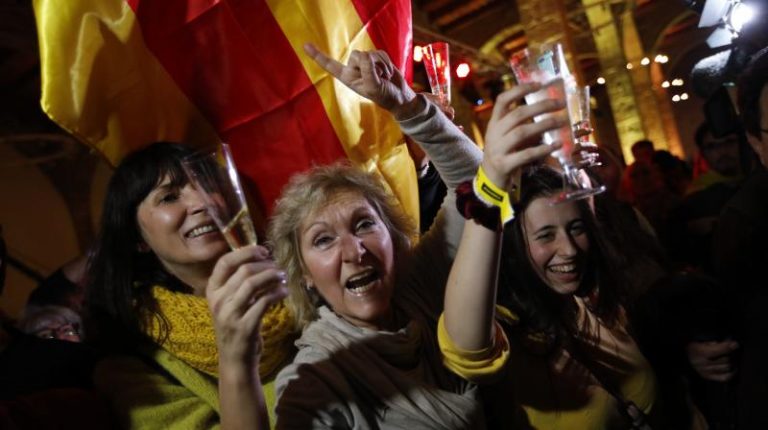
-
Release of some political prisoners
Read moreJudge Llarena decreed the release of Ministers Jordi Turull, Raül Romeva, Carles Mundó and Josep Rull on December 4, 2017; but kept in pre-trial prison Vicepresident Oriol Junqueras and Minister Joaquim Forn, as well as the freedom movement leaders Jordi Sànchez and Jordi Cuixart.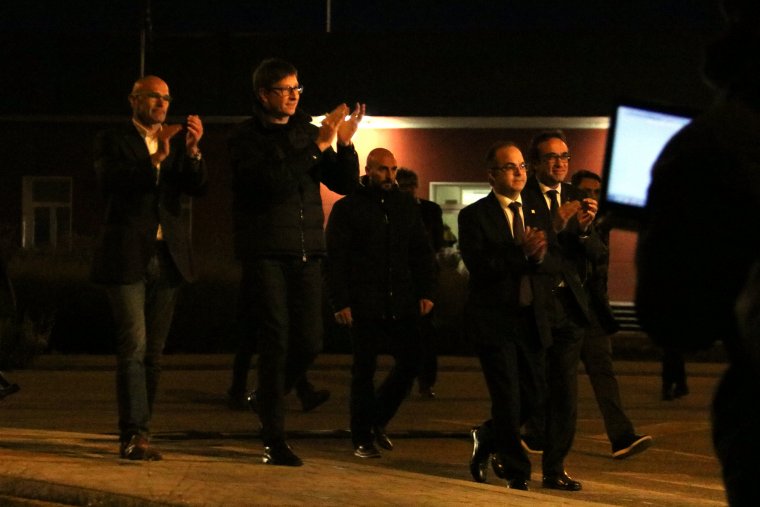
-
Rally for the Freedom of the Political Prisoners
Read more750,000 people gathered in the Marina street in Barcelona in a 3km rally.
The rally was organized by ANC and Òmnium Cultural with the motto "Freedom for political prisoners, we are a Republic".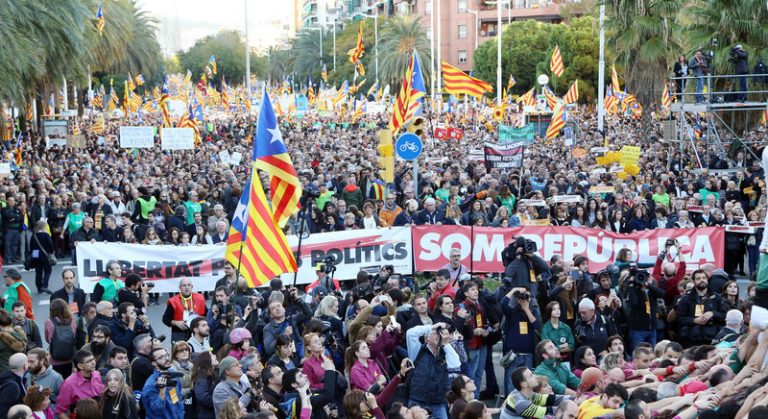
-
General strike in protest for regression in social rights
Read moreThe CSC union, with the support of the ANC, Òmnium Cultural and the AMI, summons a new general strike as a protest for the regression in social rights in Catalonia.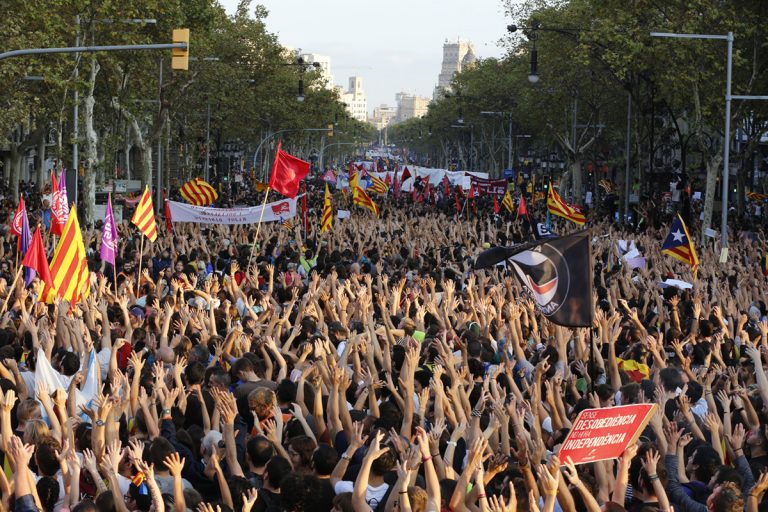
-
Imprisonment of the Legitimate Government of the Generalitat
Spain summons article 155 of the Spanish Constitution to exert direct rule over Catalonia. Vice President Oriol Junqueras or the Minister for Territory and Sustainability, Josep Rull and Ministers Jordi Turull, Meritxell Borràs, Carles Mundó, Raül Romeva, Dolors Bassa and Joaquim Forn, are imprisoned on pre-trial prison by order of Judge of the National Court, Carmen Lamela, after being charged with crimes of rebellion, sedition and embezzlement.
Half of the Government of the Generalitat is imprisoned and the other half is in exile in Brussels. The main Catalan cities see massive protests in the streets as a consequence.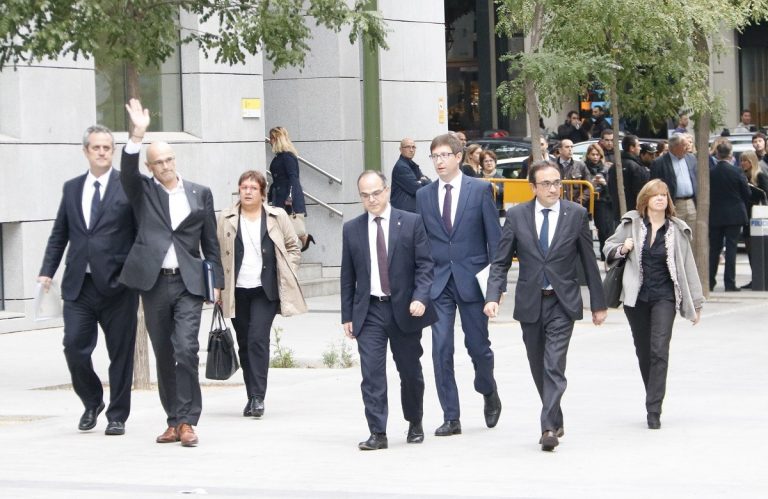
-
Exile of the President of the Generalitat and part of the legitimate Government
President Carles Puigdemont, the legitimate President of the Generalitat, announces that he is in Brussels. He faces charges for the crimes of rebellion, sedition and embezzlement. He is joined by Ministers Meritxell Serret, Toni Comín, Lluís Puig and Clara Ponsatí. An international press conference is held to tell the world the what Catalonia is going through.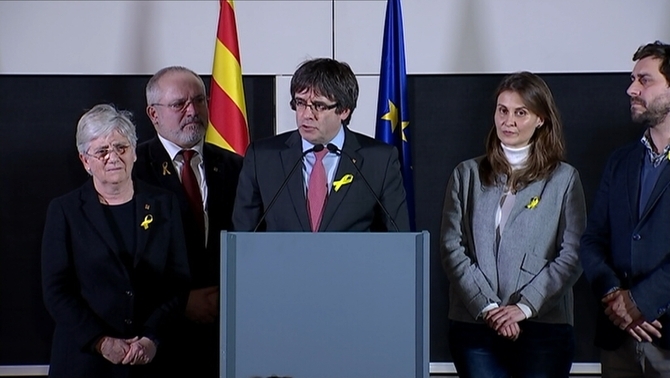
-
Declaration of Independence and direct rule via Article 155
Junts pel Sí and CUP present a statement in which they urge the Government of the Generalitat to apply the effects of the Declaration of Independence (which had been suspected by President Puigdemont 17 days before) and to open a constituent process.
The voting is carried out secretly and the parliamentary groups of Ciutadans, PSC and PPC do not participate as they abandon the Parliament before the voting. The Declaration of Independence is approved by 70 votes in favor, 10 votes against and 2 blank votes.
The Catalan Republic is constituted as an independent and sovereign state of law, democratic and social, assuming the mandate of the people of Catalonia expressed in the Referendum on Self-determination of October, 1st.
Minutes after the Declaration of Independence, the President of the Spanish Government, Mariano Rajoy, announces the direct rule of the Generalitat of Catalonia via Article 155 of the Spanish Constitution. The functions of the presidency of the Generalitat are delegated to the vice President of the Spanish Government, Soraya Sáenz de Santamaría, and the functions of each Ministers are assumed by the different ministers of the Spanish Government.
The Parliament of Catalonia is dissolved and autonomous elections are called for December 21, 2017.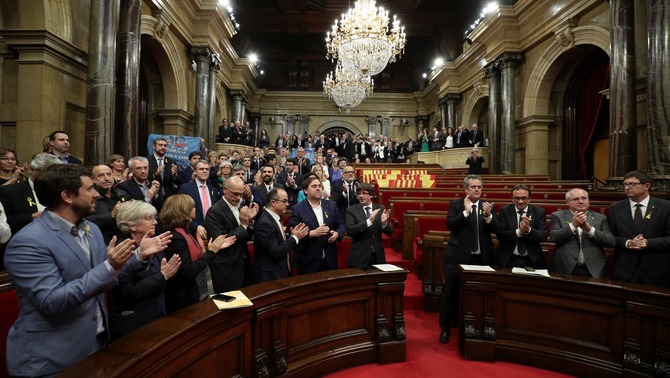
-
Imprisonment of the Jordis
Jordi Sànchez, President of the ANC, and Jordi Cuixart, president of Òmnium Cultural, were charged with the crime of sedition as organizers of the massive demonstration that took place on September 20 in front of the Catalan Ministry of Economy in protest of a Spanish police rally. The Spanish courts decree their imprisonment without bail.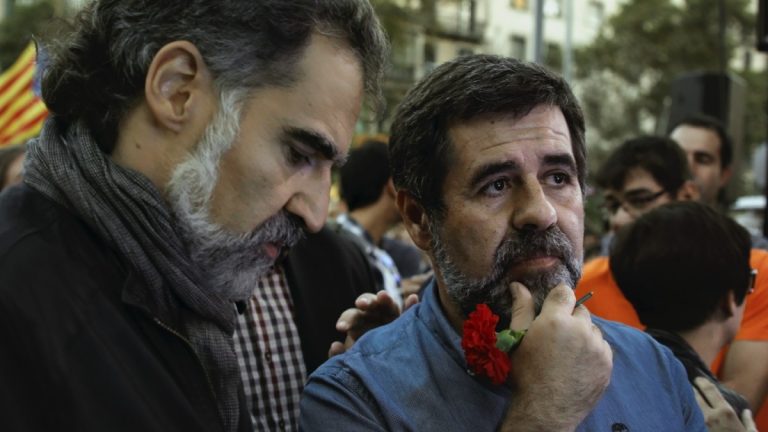
-
Declaration of Independence and temporary suspension
Read moreThe pro-independence parties sign a declaration of independence in the Parliament of Catalonia.
President Puigdemont temporarily suspends the effects of the declaration to allow for an international mediation and a negotiated solution.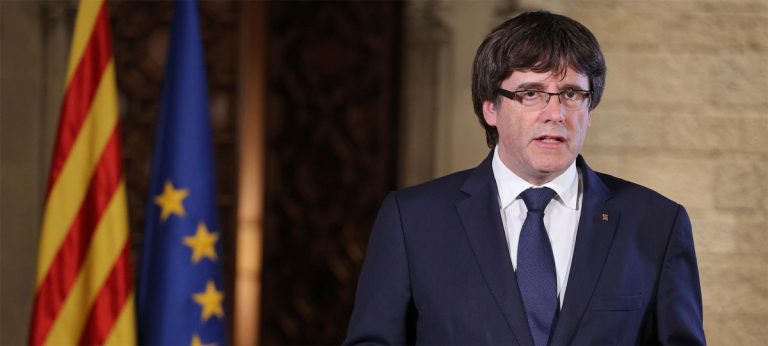
-
General Strike
Read moreGeneral strike in Catalonia in support of the referendum and against police violence.
Largest demonstration in Catalonia where people in all cities, towns and villages took to the streets.
Pro-independence protesters were joined by unionists protesting against police brutality.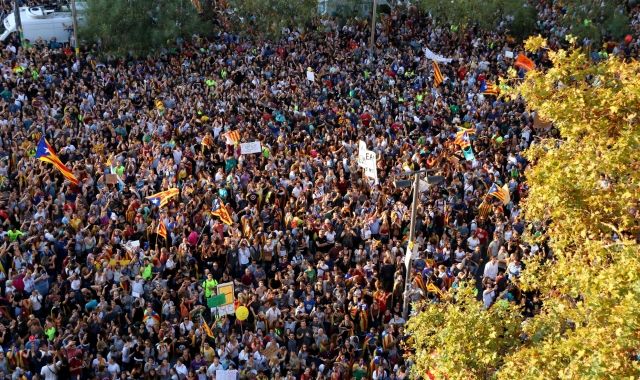
-
Independence Referendum held under Spanish police violence
With a participation of 2,2 million people (43% turnout*), the "Yes" to independence wins with 90% (2,044,038 votes) of the votes cast in the binding referendum.
The Spanish National Police and the Spanish Civil Guard confiscate ballot boxes that could not be counted and their violent intervention leaves 894 injured.
*Other Referendums turnout:
- European constitution referendum in 2005: 42% turnout in Spain
- Catalan statute of autonomy referendum in 2006: 48,85% turnout in Catalonia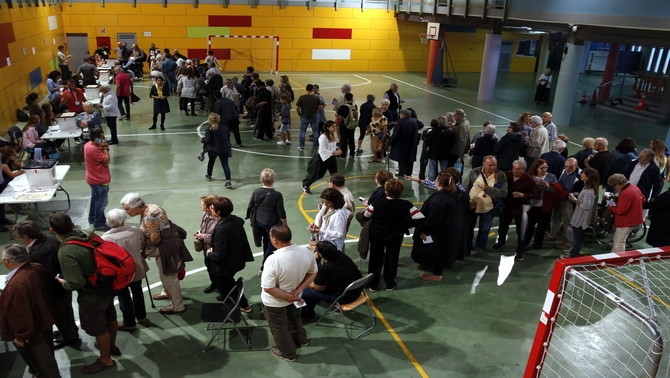
-
Mobilization in the Ministry of Economy of the Generalitat de Catalunya and at the headquarters of the CUP
The Civil Guard raids several branches of the Catalan government and holds 12 senior officials in a large anti-referendum operation.
The State Attorney General orders the police to confiscate ballot boxes and voting materials because the Constitutional Court declared the referendum on October 1 illegal.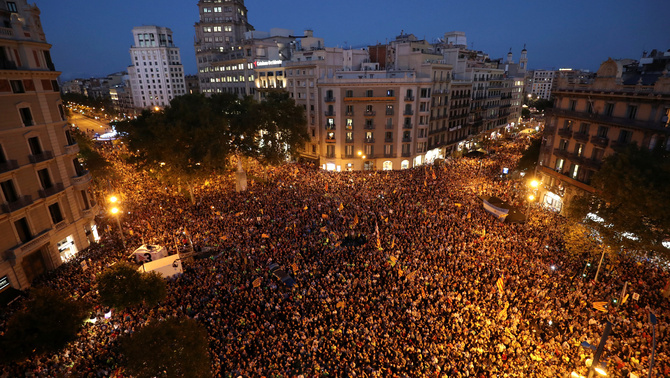
-
The YES National Day
A million people take to the streets of Barcelona to celebrate The 11S, Catalonia's National Day.
They show support for the self-determination referendum to be held on October the 1st.
Spanish President Rajoy ignores the claim, while the State Attorney General threatens more than 700 Catalan mayors with detention if they support the referendum.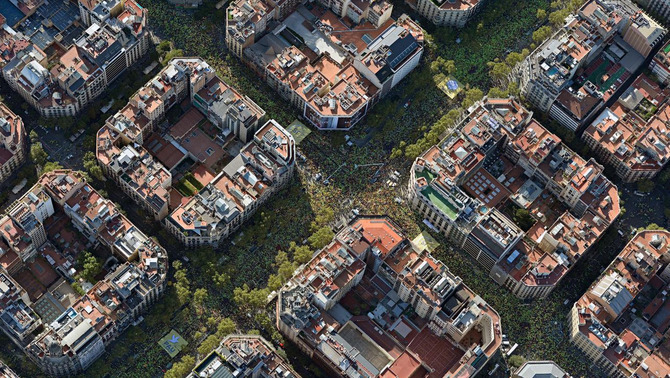
-
Referendum Law approved by the Catalan Parliament that provides a legal framework for referendum 1O
The referendum law approved by Parliament provides a legal framework for the referendum on October 1.
All the Ministers of the Catalan Government sign the decree that officially calls on citizens to express their opinion on the independence of Catalonia in a binding vote.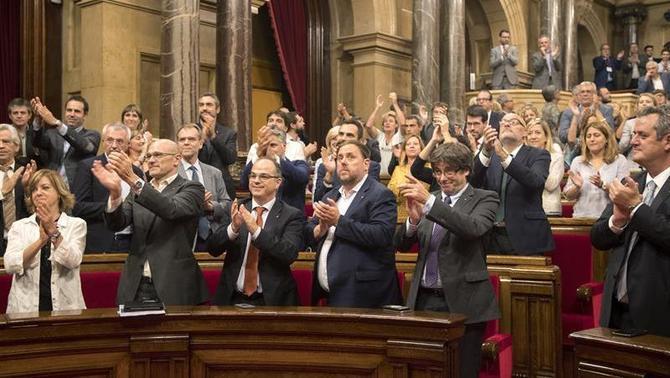
-
Announcement on self-determination referendum
Read moreThe president of the Generalitat announces the self-determination referendum for October 1.
The Catalan people will be called to the polls to answer the question: "Do you want Catalonia to be an independent State with the form of a republic?"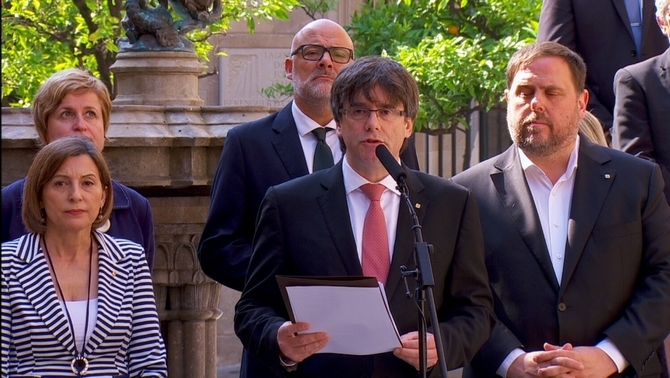
-
Catalan Government demands an agreement on the referendum to Central Government in Madrid
Read moreThe Catalan government once again demands an agreement on the referendum during a conference in Madrid.
Less than 24 hours later, Rajoy's response arrives, with the consent of the PSOE: there will be no negotiation on the referendum. -
Mas, sentenced to 2 years of disqualification for 9N independence consultation
Artur Mas, sentenced to two years of disqualification by 9N independence consultation.
Spanish justice has opened more than 400 legal proceedings related to the sovereignty process against elected officials.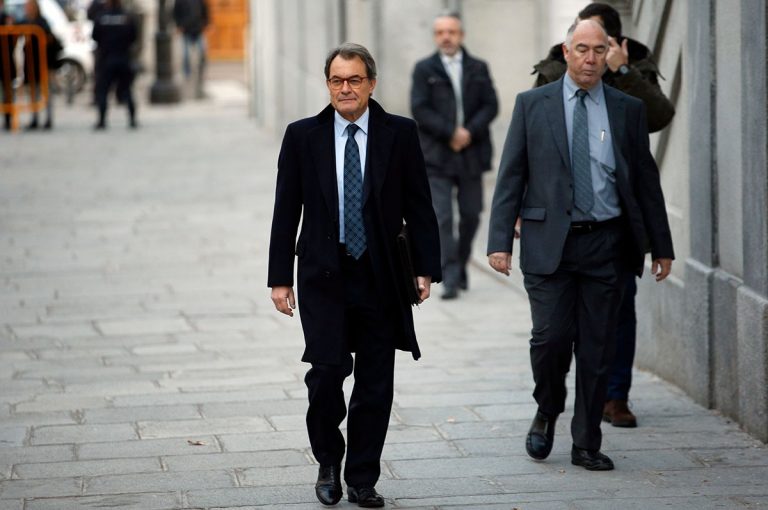
-
Rally to defend the Catalan institutions
Read more80,000 people take to the streets to defend Catalan institutions against the use of courts to stop the process of self-determination.
More than 400 elected officials are being prosecuted for political reasons, including the president of the Parliament of Catalonia, Carme Forcadell, and the former president of Catalonia, Artur Mas.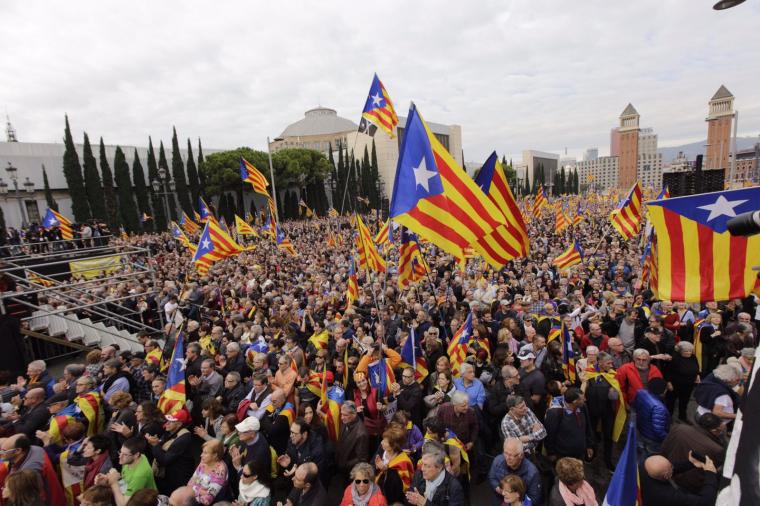
-
Almost a million Catalans take to the streets
The demonstration of this Diada took place in 5 different Catalan locations: Barcelona, Tarragona, Lleida, Salt and Berga; and brought together more than 800,000 people vindicating a binding referendum of self-determination.
-
Spanish general election
Read moreThe political deadlock marks the first time that a Spanish election was triggered due to failure in the government formation process. Ahead of the election, Podemos and IU joined forces to form the Unidos Podemos alliance, along with several other minor left-wing parties.
PP wins the election with 137 seats, followed by PSOE with 85 seats, Unidos Podemos 71, with ERC with 9 seats and CDC with 8 seats. As a result Mariano Rajoy is elected president.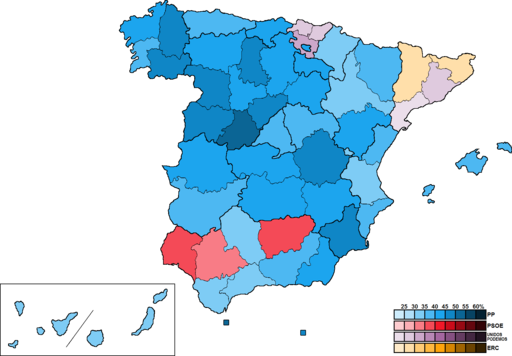
-
Carles Puigdemont, 130th President of Catalonia
Read moreCarles Puigdemont is chosen 130th president of Catalonia with the vote of 70/135 deputies. President Artur Mas relinquishes his post to facilitate the constitution of a new independence government. The new government is committed to lead Catalonia to independence in a year and a half.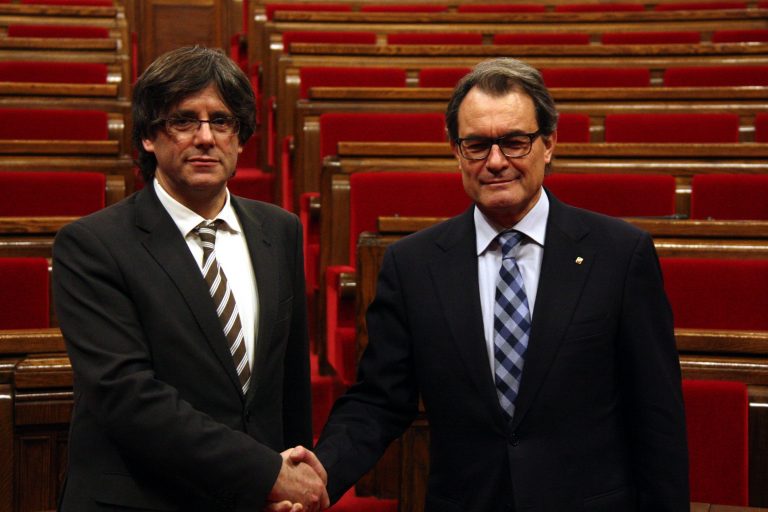
-
Spanish general election
Read moreAfter a legislature plagued by the effects of an ongoing economic crisis, corruption scandals affecting the ruling PP party and social distrust with traditional parties, the election results in the most fragmented Spanish parliament in its history.
Prime Minister Mariano Rajoy's PP emerges as the largest party overall, it obtains its worst result since 1989. The party's net loss of 64 seats and 16 percentage points also marks the largest loss of support for a sitting government since 1982. Opposition PSOE obtains its worst result since the Spanish transition to democracy, losing 20 seats and nearly 7 points. Newcomer Podemos (Spanish for "We can") ranked third, winning over 5 million votes, some 20% of the share, 69 seats and coming closely behind PSOE. Up-and-coming Ciudadanos enters the parliament for the first time with 40 seats, though considerably lower than what pre-election polls had suggested.
No party secures a majority. Ensuing negotiations fail to produce a stable governing coalition, paving the way for a repeat election. -
Pro indy parties win the absolute majority at the Catalan Parliament elections
With an exceptional participation of 77.44%, the independence forces win by absolute majority the elections to the Parliament of Catalonia with 72 of the 135 seats.
The results legitimize the Parliament of Catalonia to move towards an independent Catalan state. The results are: 47.8% of voters support pro-independence lists, and 39.1% to unionist parties. 13% voted for lists that supported the right to decide but without a clear opinion about independence or were blank votes.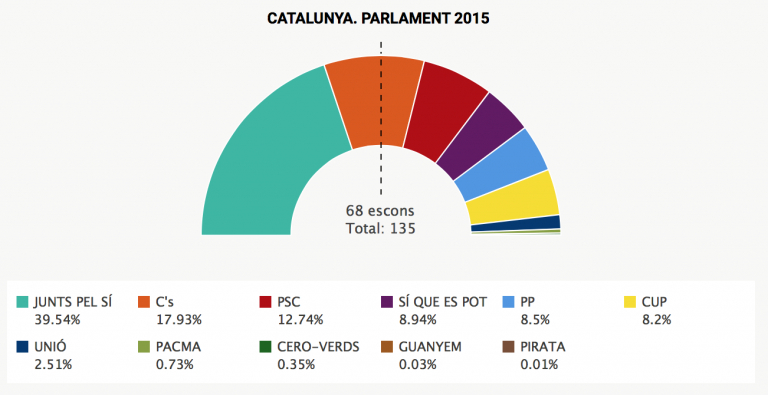
-
Another Diada that fills the streets of Barcelona
Over 2 million people take to the streets in Barcelona to demonstrate in favor of independence.
A new mass demonstration takes to the streets of Barcelona, a few weeks before the elections.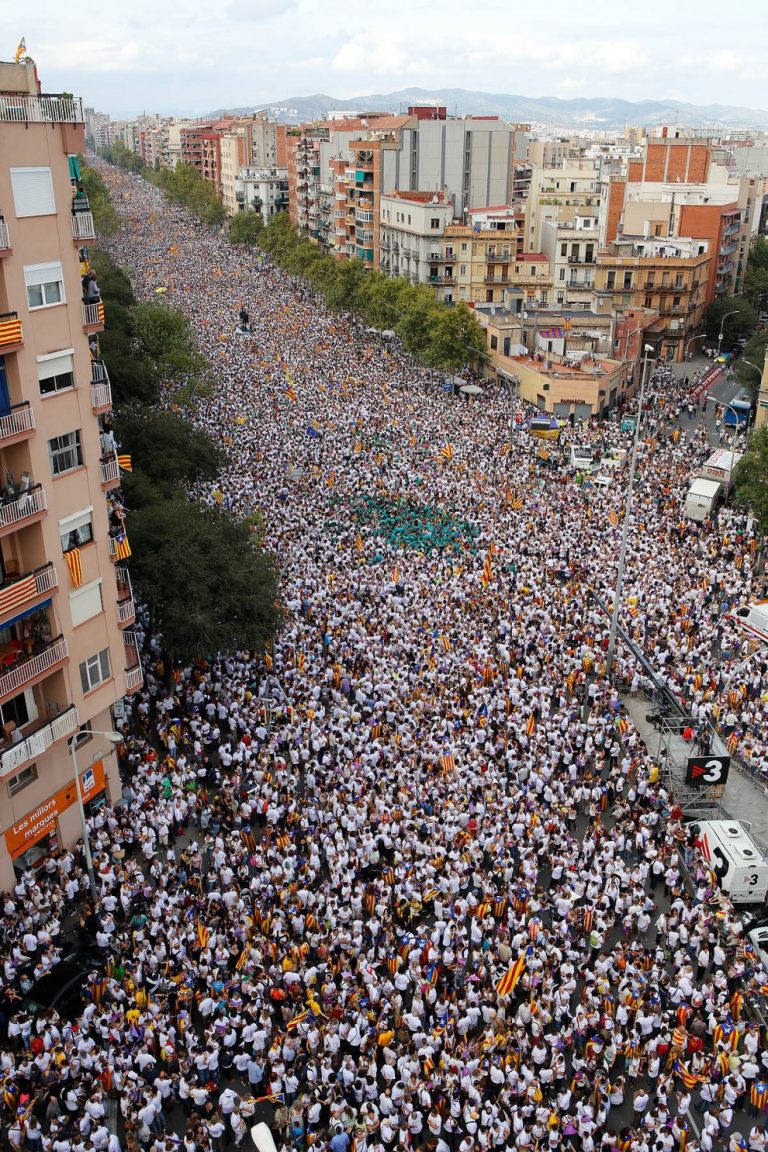
-
Official call for elections for Sept 27.
Read moreThe president of Catalonia officially calls the elections for September 27.
Although Artur Mas accepts that a regional election is not the best way to ask people about independence, he understands that it is the only way to allow citizens to express their opinion in a legal vote (Spanish institutions could only block them by suspending the autonomy of Catalonia). -
Agreement to hold a 'de facto' referendum through early elections on September 27
Read moreCatalonia will hold a 'de facto' independence referendum through early elections on September 27.
Following the agreement reached between the two main pro-independence parties (CiU and ERC) and representatives of the main civil society organizations that support self-determination. The Spanish government has blocked the other alternatives for holding the referendum. -
Rajoy visits Bcn and criticizes Catalonia's self-determination plans
Read moreSpanish Prime Minister Mariano Rajoy visits Barcelona for the first time since the November 9 vote and harshly criticizes Catalonia's self-determination plans during a Popular Party meeting.
Rajoy ignores the offer of meeting made by the Catalan President but reiterates that he is open to discuss on any subject except "the unity of Spain". -
Mas defends the right of the Catalan people to hold legal and binding voting on independence
Read morePresident Artur Mas defends the right of the Catalan people to hold a legal and binding vote on independence.
It is prepared to call early elections, which will be a de facto plebiscite on independence if the Spanish government insists on blocking the other alternatives. -
Criminal complaint against Mas, Rigau and Ortega for 9N independence consultation
Read moreThe Attorney General of the State files a criminal complaint against President Mas, the Vice President and the Minister of Education for "not stopping" the 9N independence consultation.
The three Catalan representatives are accused of disobedience, prevarication, misappropriation of public funds and abuse of power. They could be tried, suspended and imprisoned because they did not stop the democratic exercise.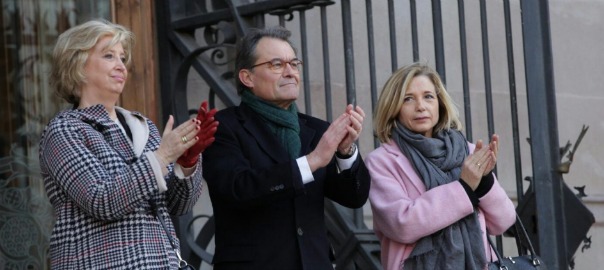
-
Rajoy affirms that "it was not a democratic vote"
Read moreThree days after the 9N independece consultation, the Spanish President Rajoy affirms that "it was not a democratic vote, but an act of political propaganda and a useless farce."
He also believes that the 9N independence consultation vote was a "failure of the independence project, since two-thirds of potential voters did not participate." -
9N non-binding referendum
Despite the barriers of the Spanish Government and the courts, more than 2.3 million Catalans vote in the engagement process: 80.76% in favor of independence, 4.54% in favor of the status quo and 10,07 in favor of a "third way".
The consultation is possible thanks to the collaboration of 30,000 volunteers. International observers consider it a successful vote under exceptionally difficult circumstances, and President Mas considers it the last step before the final vote.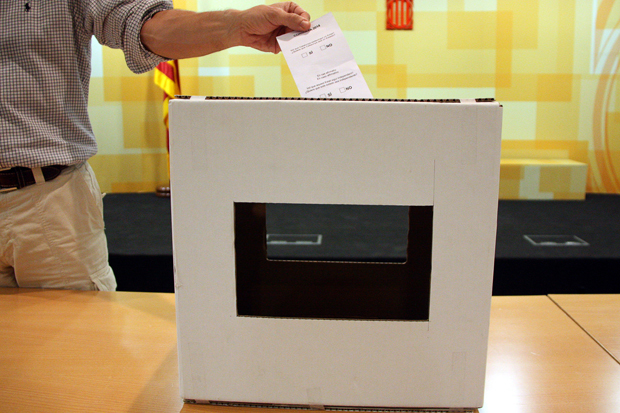
-
The TC suspends the process of citizen participation 5 days before the event
Read moreThe Spanish Constitutional Court cancels the process of citizen participation five days before the event.
Because of the Constitutional Court's barriers, the Government of Catalonia decides to propose to different non-governmental organizations to organize the democratic exercise. -
Mas announces a new vote through a process of citizen participation
Read moreOnce the popular consultation is prohibited, plan B consists of organizing a "process of citizen participation", a tool already provided for in the Statute that allows citizens to express themselves in public affairs and which includes the act of voting. -
97% municipalities in Catalonia approve statements in favor of 9N independence consultation
Read more920 of the 947 mayors of Catalonia meet at the headquarters of the Government of Catalonia in Barcelona to show their support and commitment to the consultation on November 9.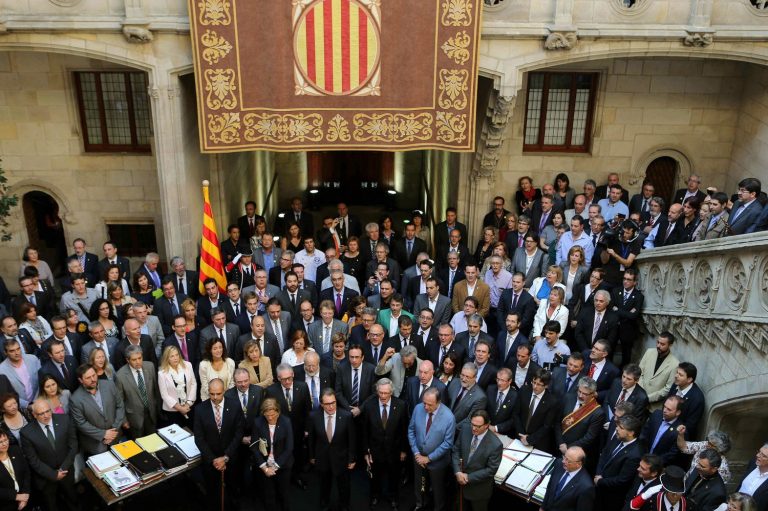
-
The Spanish Government urges the TC to suspend the 9N independence consultation
Read moreIn an urgent and unscheduled plenary meeting, the Constitutional Court accepts the Spanish Government's appeal and decides to temporarily suspend the Law of non-binding consultations and the decree calling the consultation on November 9. -
Mas signed the decree of the call for the 9N independence consultation
Read moreThe citizens of Catalonia will vote in favor of the status quo, in favor of a new accommodation for Catalonia within Spain (subject to Madrid's proposal) or in favor of independence. Registered foreigners and young people between 16 and 18 years old can participate.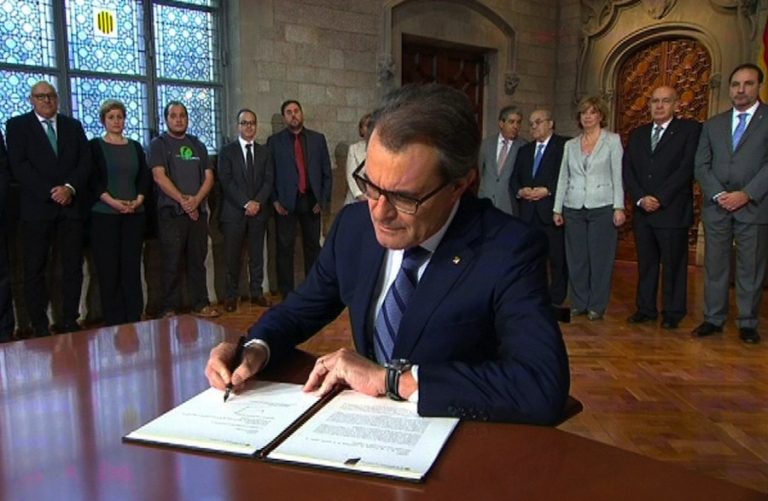
-
The Catalan Parliament approves the law of popular non-binding consultations
Read moreAs the referendums can only be called by the central government in Madrid and it refuses to do it, the Parliament of Catalonia approves an autonomous law that should enable the Catalan Government to organize a less formal vote, the so-called "popular consultation". -
Diada "V"
1.8 million people take the the streets of Barcelona to celebrate the National Day of Catalonia and ask to vote on November 9th.
They form a mosaic with the colors of the Catalan flag of 11 kilometers long in the form of a giant V that claims "Votar".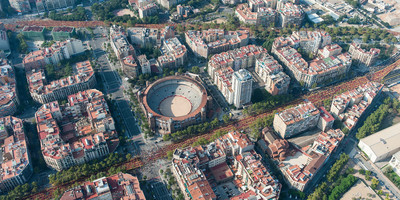
-
Spanish Parliament votes against transferring the referendum jurisdiction to Catalonia
Read moreThe two main Spanish parties (Partido Popular and Partido Socialista) agree and vote "no". 86% of the camera votes against and only 13.5% do it in favor. -
Parliament makes a formal request to hold a referendum
Read moreAs happened in the United Kingdom, the Parliament of Catalonia asks the Spanish Government to transfer the legal powers to hold a referendum. This vote comes to be requested eighteen times by the Catalan institutions.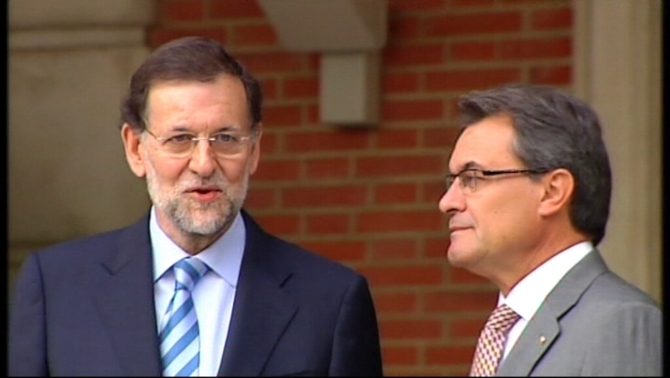
-
Diada: Via Catalana
About 2 million Catalans hold hands to form a human chain that covers 400 kilometers north to south of Catalonia asking for independence.
The Catalan National Assembly organizes a demonstration inspired by the Baltic Road of 1989. Smaller human chains are also organized in more than 100 cities around the world. In total, 1,600,000 demonstrators participated in the Via Catalana.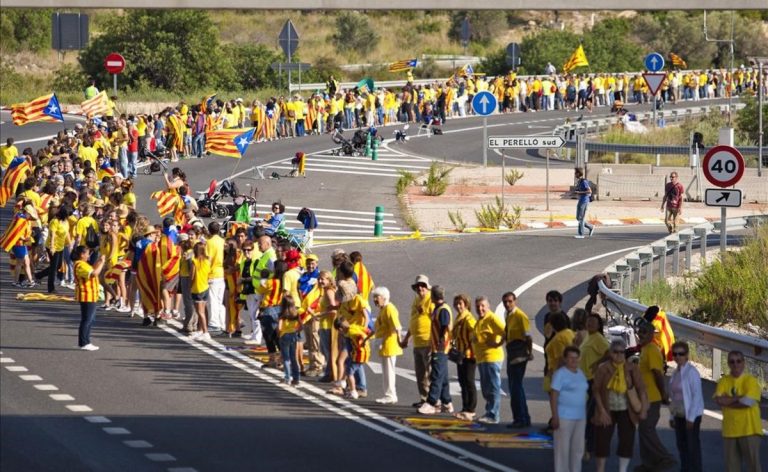
-
77% of the Catalan Parliament requests to start negotiations with the Spanish Government
Read moreThe request is supported by 104 of the 135 deputies, including those belonging to the government coalition and four opposition parties. Only two parties reject it (Partido Popular and Ciudadanos). -
Declaration of Sovereignty and the right to decide of the people of Catalonia
Read moreWith the approval of this resolution by the Parliament of Catalonia, it was agreed to initiate the process towards the right to decide, with 85 votes in favor, 41 against and 2 abstentions. The Constitutional Court of Spain suspended the Declaration, but the Bureau of the Parliament of Catalonia considered that it remained "in force" because "a political wish cannot be suspended". -
Elections in CAT: 80% Parliament supports self-determination
Read more107 of the 135 deputies of the new Catalan Parliament are in favor of a referendum on self-determination as the best option to know what most Catalans think about independence and how to effectively channel from the institutions the massive independence movement that goes from bottom to top. -
Another “No” from Madrid.
As Spanish Prime Minister Mariano Rajoy refuses to offer any specific proposals in political or budgetary terms for Catalonia, Catalan President Artur Mas and several Catalan parties agree to hold regional elections in order to see whether there has been a considerable change in the citizens’ perception of the option of independence, as the demonstration in Barcelona seemed to show. -
On Catalonia’s National Day, 1.5 million people attend a demonstration in Barcelona with ‘Catalonia: Next State in Europe’ as its slogan.
As no reaction comes from the political parties in Spain to the concerns of Catalan society, the civic movement shifts from a defence of Catalonia’s self-rule to an openly pro-independence stance.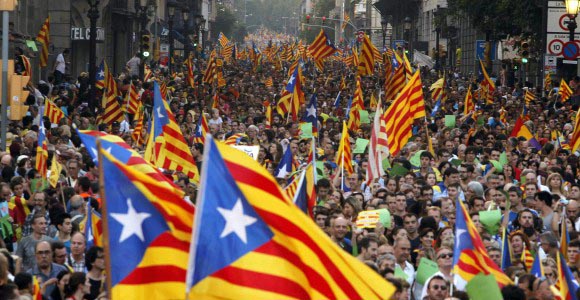
-
Creation of the Association of Municipalities for Independence
Read moreThe AMI was officially established in Vic, and since then, the number of adjoining municipalities has been growing. Nowadays, it officially brings together all the provincial councils (Barcelona, Tarragona, Girona and Lleida), 37 county councils (90.2% of the total), 787 Catalan municipalities (83% of the total), 9 decentralized municipal entities and 1 consortium.
For more information: http://www.municipisindependencia.cat/ -
Spanish general election: Rajoy gets absolute majority
Read moreThe election campaign is dominated by the effects of an ongoing financial crisis, high unemployment, a large public deficit and a soaring risk premium.
The election results in the PSOE being swept out from power in the worst defeat for a sitting government since 1982, losing 4.3 million votes and scoring its worst result in a general election ever since the first democratic election in 1977.
PP win the election with 186 seats, followed by PSOE with 110 seats, CiU with 16 seats and ERC with 3 seats. As a result Mariano Rajoy is elected president.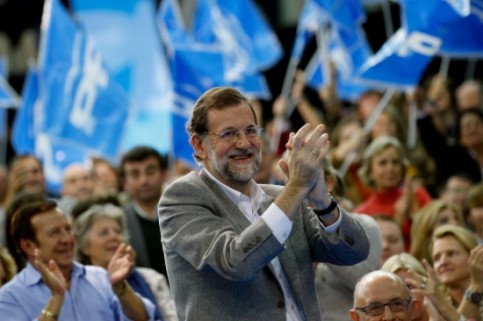
-
As a response to the Court’s sentence, a huge protest under the slogan ‘We are a nation. We decide!’ is organized.
A million citizens take to the streets of Barcelona with a clear message: the relationship between Catalonia and Spain cannot be decided by ten judges behind closed doors. However, the principal Spanish parties fail to propose how to restore the Statute to that which has already been agreed by both the Catalan and Spanish Parliaments and ratified by the people of Catalonia.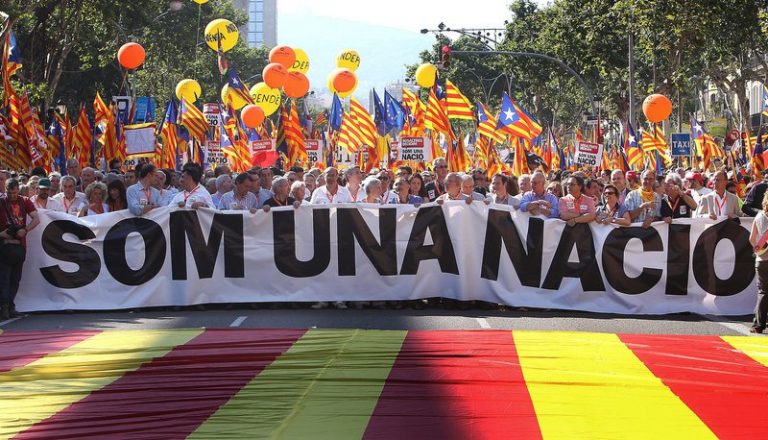
-
The Spanish Constitutional Court rewrites 14 articles of the Catalan Statute and reinterprets 27 others
After four years of deliberations, the Constitutional Court of Spain, by a 6 to 4 majority of its members, rewrites and changes the interpretation of 41 articles – mainly those relating to language, justice and fiscal policy – thus watering down even further the main tool for Catalonia’s self-rule. -
Grass-roots symbolic votation non-binding referendum on independence in Arenys de Munt followed by more than 500 municipalities
All began with the municipal consultation in Arenys de Munt (in the Maresme region) on September 13, 2009. Subsequently there were 4 more waves in different locations in Catalonia during 2009, 2010 and 2011, when Barcelona voted. Overall 555 municipalities organised the consultation, and more than 900,000 people voted. The overall turnout was 21%.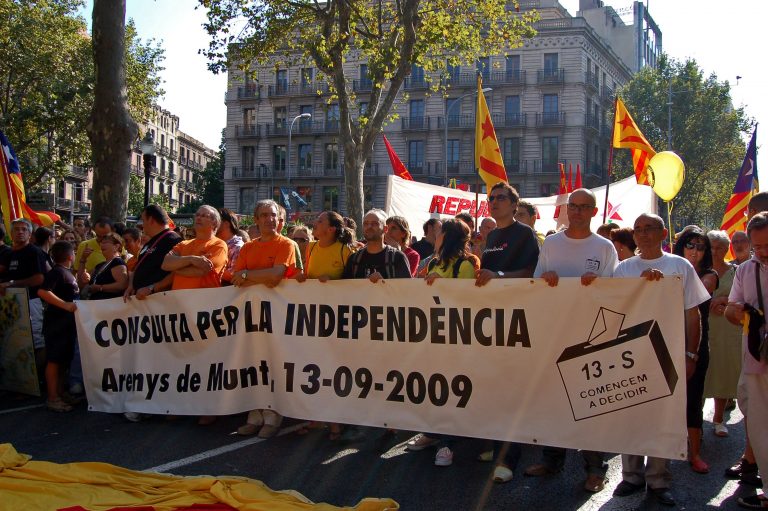
-
Demonstration in Brussels in favor of independence: 10.000 in Brussels
Read moreDemonstration to request a referendum on self-determination of Catalonia. There were 10,000 people attending, according to the organizers.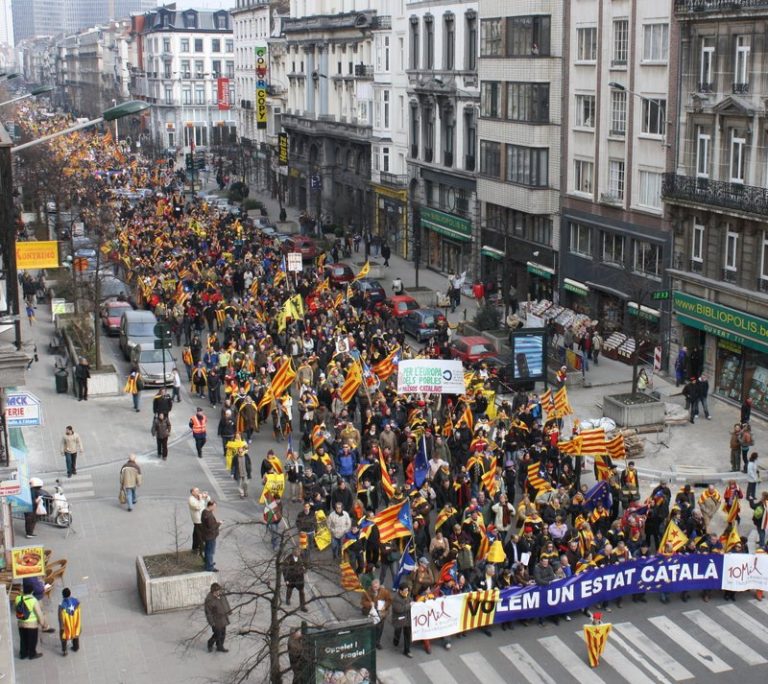
-
Spanish general election: Zapatero wins again
Read moreAfter four years of growing bipolarisation of Spanish politics, the election sees a record result for the ruling PSOE and opposition PP, together obtaining more than 83% of the vote share—over 21 million votes—and 92% of the Congress seats.
As a result Zapatero is sworn in as Prime Minister of Spain for a second term in office in April 2008, just as the Spanish economy begins showing signs of fatigue and economic slowdown after a decade of growth. -
Jose Montilla becomes 128th President of the Generalitat of Catalonia
Read moreJose Montilla was invested by the Parliament as the new president of the Generalitat by 70 votes in favor and 65 against.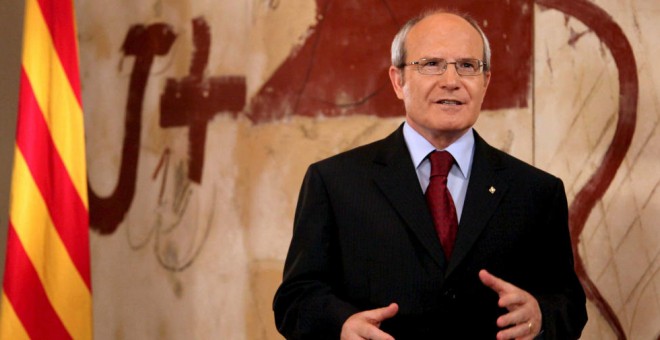
-
Election to the Parliament of Catalonia
Read moreThe outcome is similar to that of 2003. Again, CiU is the most voted party (48 seats, two more than in 2003), but the PSC, ERC and ICV-EUiA revalidate the absolute majority (37 seats for PSC, 21 ERC and 12 ICV-EUiA). They form a tri-party government under the presidency of socialist José Montilla with the republican independence leader Josep Lluís Carod Rovira as vice president. The new Ciutadans party enters the Parliament with 3 seats, which, like the PP (14 seats), was in direct opposition to the new Statute. -
The PP against the new Statute
Read moreThe Partido Popular files a constitutional complaint against the new Statute of Catalonia, in which 114 of the 223 articles and 12 provisions are amended. Mariano Rajoy lists the elements of unconstitutionality that his party saw in the Statute: 1. Catalonia being a nation, since "from the constitutional point of view, there is no other nation than the Spanish nation, holder of sovereignty”; 2. The "privileged" treatment of the Catalan language derived from considering its knowledge as a duty and "the exclusive consideration of Catalan as the language of education"; 3. The Judicial Power for Catalonia, because "it breaks with the judicial unity of Spain"; 4. The distribution of competences between Catalonia and the State; 5. The bilateral principle "that privileges Catalonia and lays the foundations of an asymmetric confederal model" and supposes "an inadmissible inequality in the Constitution"; 6. The international relations of Catalonia; 7. Catalonia’s own financing system, “it must be agreed between all the autonomies.”
Reactions of the Catalan parties to the amendments are immediate. The PSC accuses the PP of acting with "disrespect towards the Catalans" who has approved the new Statute in a referendum and of "underestimating" the idea of "plural Spain". ERC warns that if the Constitutional Court approves the appeal, the new Statute “will not meet the needs of Catalonia and will show that another constitutional framework that respects our rights was necessary". CiU describes the PP initiative as "aggression against Catalonia", although it recognises that it was a "legitimate and respectable" decision, while ICV predicted a failure of the Popular Party in the upcoming Catalan elections. -
Catalonia votes the new Statute
A referendum on the Statute is held in Catalonia, and the YES wins, defended by the PSC and ICV, with 73.90% of the votes, while the NO, supported by ERC and the PP, remains at 20.76%, although the abstention was 50.59% (there was 5.3% of blank votes). Once the results are known, the president of the Generalitat Pasqual Maragall tells the people: "Dear Catalans: we have Statute," and urges ERC and PP to "join the consensus" to develop the Statute.
The approval of the Statute becomes a "bitter victory" for Pasqual Maragall since a few days after the referendum, under pressure from his own party, he announces that he will not be the socialist candidate for the presidency of the Generalitat.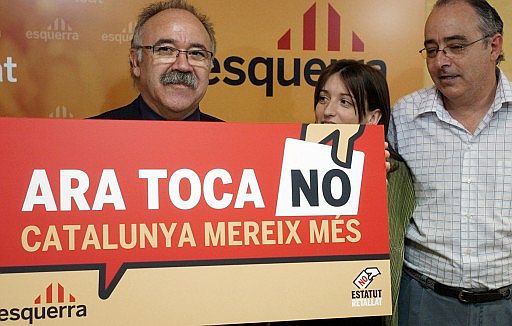
-
The Spanish Parliament approves a watered-down version of the Statute.
Read moreThe two chambers of the Cortes Generales discuss and water-down the text proposed by the Parliament of Catalonia. Prime Minister Zapatero disappoints many Catalans as he cannot honour his promise to pass the text as originally drafted by the Catalan Parliament. . Catalonia loses the power to collect taxes, and is not defined as a nation in the Statute. -
Massive demonstration against the watering-down of the Catalan Statute in the Spanish
Read moreParliament after the agreement reached by the prime minister of Spain, Rodríguez Zapatero and the leader of the Catalan center-right nationalists, Artur Mas. Under the slogan “We are a nation. We have the right to decide” called by the Plataforma pel Dret de Decidir, hundreds of thousands fill the Gran Via Street, from Plaça Espanya to Plaça Catalunya. -
The Spanish People’s Party starts a campaign against the new Catalan Statute
Read moreMariano Rajoy’s party challenges the law from the opposition bench before the Spanish Constitutional Court, which, surprisingly, decides to hear the case. Four million signatures are collected throughout the rest of Spain against the Statute. -
The Parliament of Catalonia passes its proposal for a new Statute of Autonomy.
Read moreThe Parliament of Catalonia approves (with the support of 120 MPs out of 135) and sends to Madrid a proposal to reform the 1979 Statue of Autonomy recognising Catalonia as a nation, preventing Madrid’s interference in devolved powers, and giving Catalonia full control over a transparent and rational financial arrangement. The text has to be validated by the Spanish Parliament and confirmed by the Catalan people in a referendum before it will enter into force. -
Spanish general election outcome influenced by the Madrid train bombings
Read morePSOE win the election with 164 seats, followed by PP with 148 seats, CiU with 10 seats and ERC with 8 seats. As a result the socialist José Luís Rodríguez Zapatero is elected president.
The electoral outcome is heavily influenced by the aftermath of the 11 March 2004 Madrid train bombings. For the remaining days before the election, the PP government keeps claiming evidence that the terrorist organization ETA was responsible for the bombings. However, it soon becomes evident that the bombings has not been authored according to ETA's modus operandi, and new evidence points out to an Islamist attack with possible links to al-Qaeda.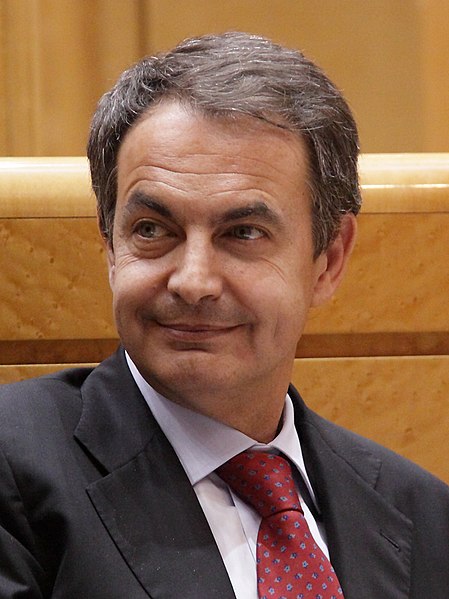
-
Parties supporting a new Statute of Autonomy obtain 88% of seats and the popular vote in the Catalan elections
Read moreDuring the campaign, José Luis Rodríguez Zapatero, the leader of the Spanish Socialist Party and future Prime Minister of Spain, commits himself to supporting the new Statute which will be drafted by the Parliament of Catalonia. -
After 25 years of unsatisfactory interpretations of the 1979 Statute and a continued failure to implement it properly, Catalan political parties propose to set out definitively the political status of Catalonia within Spain
Read moreIn the run up to the regional elections, the main Catalan political parties propose to reform the 1979 Statute of Autonomy with the aim of finally accommodating Catalonia within a pluralistic Spain.